#and how the maidens are controlled and dehumanized
Text
the funniest thing they could do with the summer maiden, no matter who she is, is to make her someone who doesn't want to fight.
she's the maiden of destruction and instead of leaning into that she's like "training? no thanks, i'm good :)"
#rwby#and IF she's a child#it's even better#with all the child soldier stuff going on#and how the maidens are controlled and dehumanized#like sir. let this child be a child please and thank you
85 notes
·
View notes
Note
I'm just thinking about your points about Penny and dehumanization and the heroes essentially taking decisions away from Penny while trying to protect her. Penny and Winter don't interact until Penny passes the Maiden powers to Winter in Volume 8. But in 7 - the last time they see each other - Winter buys time for Penny to make her decision with Fria. Which I think puts a neat layer into Penny ultimately saving Winter in the Winter versus Ironwood fight.
You can read Penny being puppeteered as a continuation of the dehumanization and how Atlas treats individuals. And she never really has a chance to fight that personally. The whole Cinder blowing up the evac plan happens first. But Peny being the tipping point with Winter versus Ironwood, especially in the reading that they were both baring the weight together... The thing is it is very very hard to get out of bad situations solo. And Penny did get someone out. I hope this makes sense
what always gets to me is. winter panics when penny rescues her ("what are you doing?! my life doesn't matter!") because it puts fria and the staff in jeopardy. and then not five minutes later she makes what is clearly a conscious, deliberate choice to step back and let fria choose penny as her heir, throwing herself in between them and cinder with her aura still depleted, against ironwood's orders. it's such an important moment bc it reveals that winter absolutely meant what she told penny earlier about wrestling with her feelings because she values her humanity—winter is not mindlessly following orders or blindly self-sacrificial, but she is willing to die for what she believes is right.
(winter is also the reason we know fria's name, because she makes a point of saying fria instead of calling her the winter maiden. which is the moment her break from ironwood becomes narratively inevitable, that rejection of fria's dehumanization)
i think the way penny frames the situation to jaune is really revealing of her perspective on… everything that's happened to her since she became the maiden. in her eyes it snatched away what little autonomy she had; ironwood and the ace-ops pulled out all the stops to manipulate and then outright control her, and all of her friends collectively decided that the maiden power was too valuable and too vulnerable for penny to do anything except go hide somewhere they hoped salem couldn't follow. everyone puts so much emphasis and importance on the magic that when penny is being eaten alive by watts' virus she considers the situation in terms of "i can make sure the powers go to [ruby]."
so when cinder fatally wounds her--and penny recognizes that there isn't enough time to heal her (& there isn't, he had less than sixty seconds before cinder had weiss disarmed on the ground)… "let me choose this one thing."
it's weiss, or winter, or cinder. if jaune hesitates or ignores what penny tells him, cinder kills weiss and then him and then claims the power for herself; if he mercy-kills penny now, penny can make sure the power goes to weiss so that weiss can get herself and jaune out alive…
…or she can give it to winter, her best friend. who for all she knows is already in vacuo right now, as penny has no way of knowing that ironwood is free or that winter is in danger.
in many ways, winter is the wrong choice in that moment; weiss and jaune are in danger, cinder has both relics, and without the magic weiss doesn't stand a chance. winter is not here, and penny has no idea where she is--or even if she's still alive!--so the pragmatic choice, the "correct" decision, the thing she "needed" to do, was make sure the magic went to weiss.
penny's whole arc in atlas is about the unreconcilable conflict between what she needs to do and what she wants to do, and in the end--forced by horrible circumstances to make a binary choice--she chooses to do what she wants. to follow her heart. to think of her friend. to take a small moment of peace and happiness for herself by saying goodbye to someone she loves very dearly.
and that's the moment of triumph over ironwood, who saw his own humanity as his greatest weakness!! penny choosing to do something for herself, because it's what she wants. in coldly rational terms it was the wrong choice, but thematically it was the right thing for penny to do--the human thing--so it saves not only winter but also weiss and jaune, too (although both of them do fall, because penny took a risk and a central theme of V8 is that risks don't always turn out for the best).
it's such a well-constructed tragedy. and it's thematically so important that penny choosing her friend over her 'duty' is the only reason winter survives, bc that final battle between ironwood and winter symbolizes the ideological conflict of the atlas arc--is human feeling strength, or is it weakness? has he made hard but necessary choices or has he sacrificed everyone and everything that truly mattered?--so of course penny's humanity is his undoing.
52 notes
·
View notes
Text
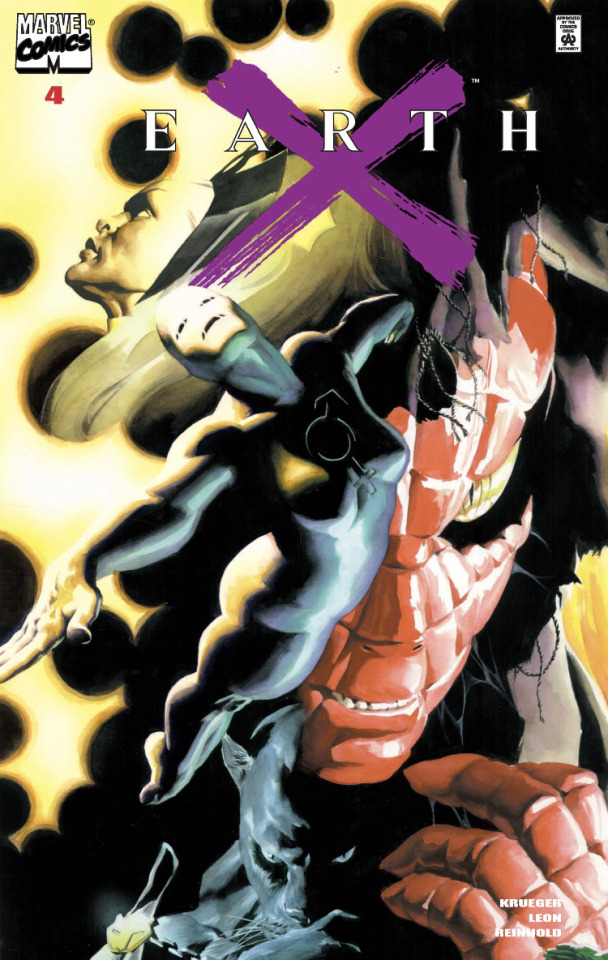
Earth X #4
Hi Storm, Iron Maiden, a spider guy, and kitty.
The thing about Earth X is that the X might as well stand for Xtremely messed up unless the book states otherwise.
The world is probably doomed because something about vibranium. Humanity went through a mass empowering event also maybe because vibranium. The Avengers are dead, the Fantastic Four is no more, Reed is Doom, Captain America is wearing a flag toga. A mind control squid hivemind is plaguing New York. A mind control kid called the Skull is gathering an army in California. Uatu the Watcher was blinded and kidnapped Aaron Stack Machine Man to be his seeing eye robot and is a dehumanizing dick to him.

A lot is going on. But we are getting answers. Possibly the wrong answers. I trust Uatu less and less.
In the last issue, the Inhumans came to Reed in Latveria for help finding the lost Inhuman Prince. But they get sidetracked with Reed’s problems.
Like mutating all of humanity with vibranium, maybe.
(By the way, a part of the puzzle gets casually solved by the Skull. Reed’s beacon tower blew up because the woman who would become Iron Maiden fell into an open vat of liquid vibranium. An OSHA violation has forever changed humanity.)
But when Reed mentions vibranium, the Inhumans tell him they saw a planet out in space that had been exploded from the inside out. And that they believe vibranium was related.
So Reed calls T’Challa.
T’Challa is a kitty now. And married to Storm.
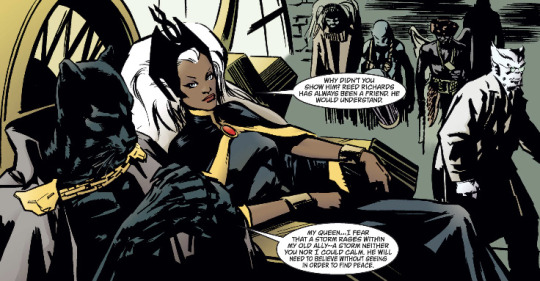
(Tally another one for something the 616 would copy from Earth X)
Reed asks T’Challa if they can stop or slow down the vibranium’s generative rate. Because I guess in this Marvel universe, the vibranium meteor wasn’t very big but it somehow makes more vibranium over time.
T’Challa dismisses Reed’s concerns. If there was a danger from vibranium, the spirits would tell him.
He doesn’t tell Reed but he also has a lot on his plate right now with a whole bunch of animals that have been mutated. There’s a zebra centaur. Just chilling in his throne room.
Earth X is so weird.
Since Reed can’t fix the mass empowering and T’Challa won’t help him with the vibranium, Reed decides to fix what he can and suggests he could find and modify Cerebro to find Inhumans instead of mutants.
Over in California, the Skull knows Captain America is in the crowd.

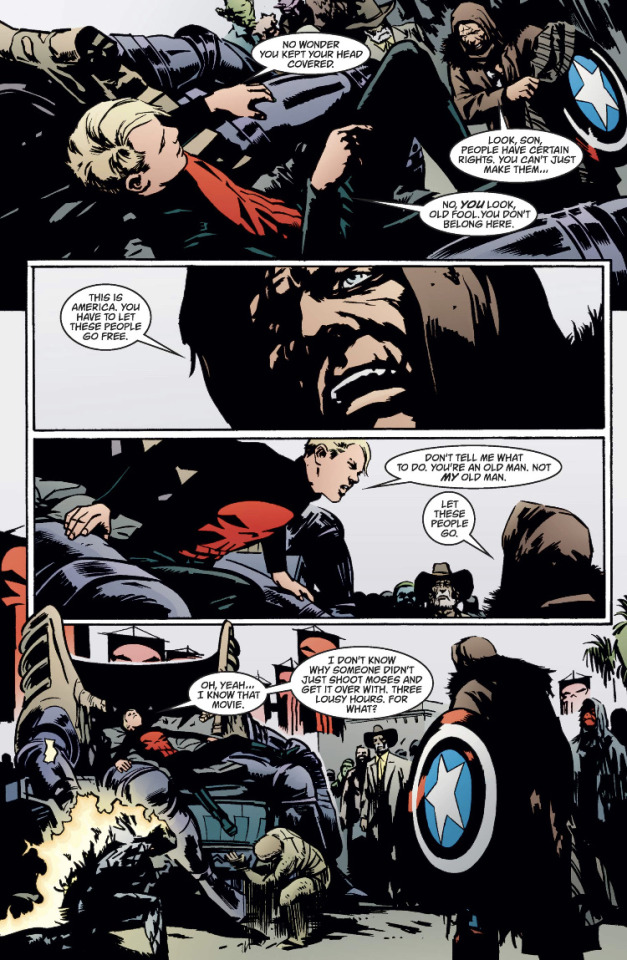
And he is simply the most perfect all-powerful brat. He’s got no ethos, no ideology, except that he should have all the things he wants.
He references pop culture several times but when Steve calls him another Hitler, the Skull blankly asks “Who?”
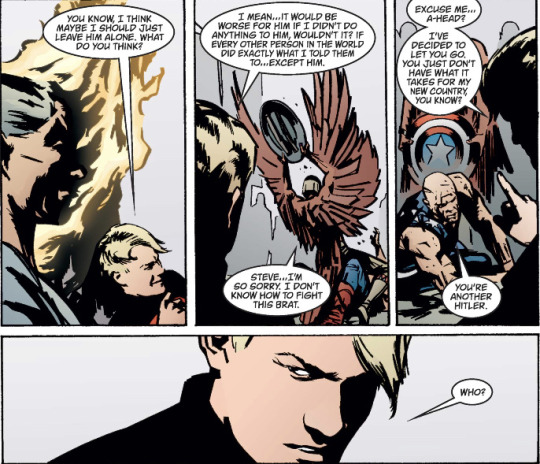
The worst person to have this much power but with everyone in the world getting mutated, it was inevitable someone like this would happen.
Captain America gets fed up with his shit and tries to deck him but the Spider-Man-looking guy from the cover throws a web which makes Steve hallucinate that he’s strangling Bucky.
And the Skull takes over Wyatt and forces him to punch Steve. While the guy is pleading with Steve to just leave because he can’t stop himself.
Possibly the creepiest kind of mind control. Completely aware, unable to resist.
To add literal insult to injury, the Skull calls Steve “Craptain.”
What really hurts is he didn’t even bother to think of a better burn.
The Skull decides that if Steve is going to blah blah blah about freedom so much, he’ll let Steve have his freedom. His freedom to watch as the Skull takes everyone else in the world while Steve can’t do shit to stop him.
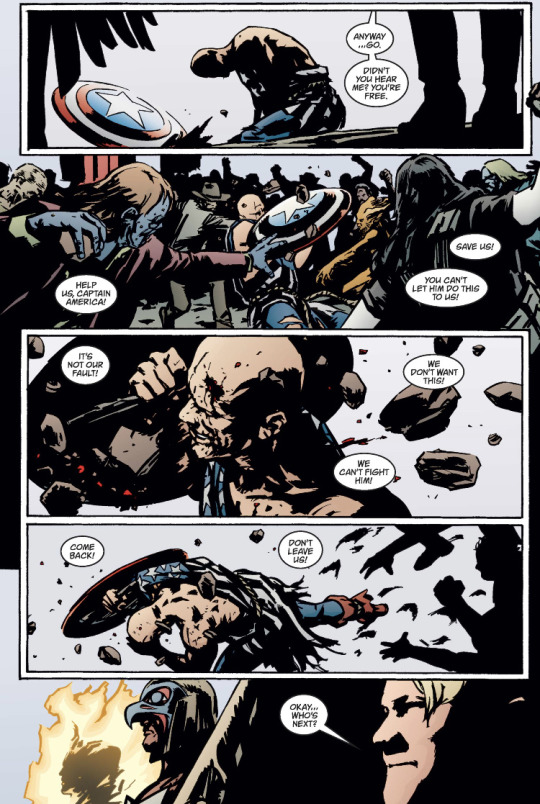
The crowd begs Steve to save them even as they pelt him with rocks under the Skull’s control.
What makes this more horrifying is that in the back of book appendix, Uatu and Aaron discuss how those that were mutated in the mass empowering event don’t seem to age and no new children are being born.
The Skull has been an overpowered brat for who knows how many years and he will likely never be able to mature.
Even scarier, Uatu claims that the Celestial’s reason for planting the seeds of this mass empowering event at the dawn of humanity (even planting the idea for the vibranium beacon tower in Reed’s dreams) is a form of propagation. Aaron interprets that to mean that humanity will super evolve into Celestials.
This forever child as a space god is scary.
Back in New York, the Hulk saves a Red Harpy looking woman (who is probably not Betty, so unsure whether this tallies another point or not) from Hydra and geez.
Earth X Hulk is weird even by the standards of Earth X.
I’ve read the prequel where it happened and I’m still not sure why Bruce mutated into a green gorilla and a child version of himself.
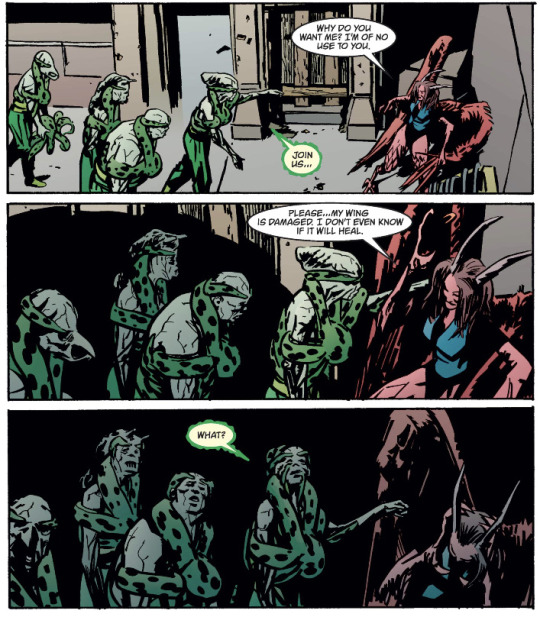
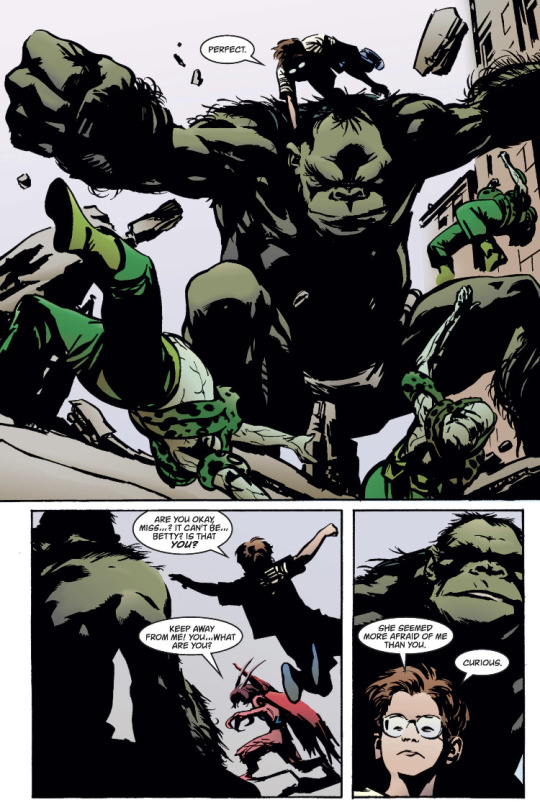
Why? Why the fuck did this happen?
The mass empowering event wasn’t even supposed to affect people who already had superpowers. Is this just a Hulk thing?
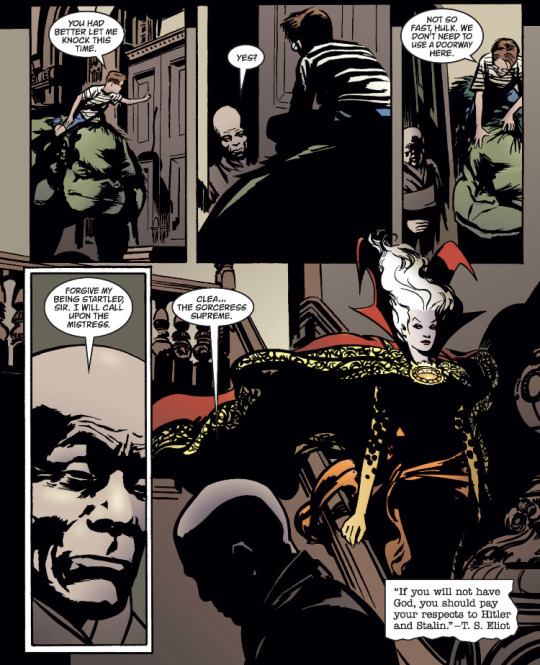
Oh, also, Clea is Sorcerer Supreme.
That is definitely something the 616 would copy later. Add another tally.
Each issue we add more characters into the mix and unravel more and more of the mystery of what the hell happened and what the hell is going to happen?
If the world is going to end, does Captain America’s conflict against the Skull even matter?
Uatu thinks not. He also sounds like a Dril tweet, saying there’s no difference between the two.
I do not like Earth X Uatu.
1 note
·
View note
Text


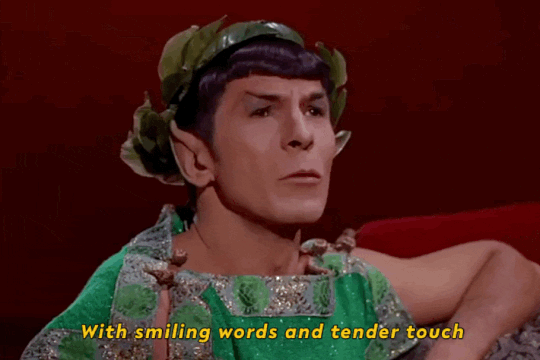




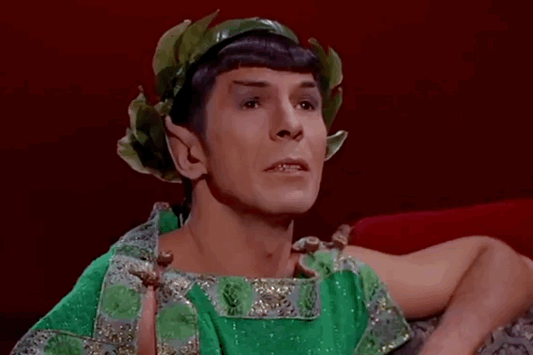
So the song “Maiden Wine” from the TOS episode Plato’s Stepchildren is gorgeous, but if we take a moment to consider the true meaning of it in the context of Kirk and Spock’s relationship, it takes on a heartbreaking significance.
Plato’s Stepchildren is about a group of psychokinetic beings who take over the bodies of the crew and dehumanize and humiliate them for their own amusement. The core message of the episode is the corrupting nature of power and the importance of autonomy, but that tends to get lost in the sheer weirdness of it all. (Seriously, it’s a strange episode.) However, what I find most compelling is Spock’s emotional journey throughout the episode, in which he is forced to confront his feelings and why he believes they must be controlled, especially in regards to Jim.
A major theme in TOS is Spock’s internal turmoil over his emotions and feelings of attachment to others. Having been raised in a society in which emotional expression is considered a shameful lack of control, Spock views his inability to regulate the intensity of his feelings as a personal failure. Which is why the Platonians’ treatment of him is especially cruel. They make him to sing and dance. They force him to laugh and cry. They make him dance around Kirk’s head, nearly injuring him in the process, as he is helpless to do anything to stop it.
And Spock is furious. But not because of the violations they committed against his own person. Rather, because of how they dared to use him as an instrument to harm Jim. Later in the episode, Spock is visibly withdrawn from the rest of the crew, silently boiling. The first thing he is concerned about is how Jim had suffered. (“I trust they did not injure you too much, Captain. The humiliation must have been most difficult for you to bear. I can understand… I might have seriously injured you, Captain, even killed you.”) He confesses that “they have evoked such great hatred in me [that] I cannot allow it to go further.” He is so deeply upset by their treatment of Jim that he literally breaks a goblet in his anger, telling himself “I must master it. I must control.” Damn.
At the end of the episode, the crew is once again exploited by the Platonians for their entertainment. And how do they choose to torment Spock? They degrade him by forcing him to sing “Maiden Wine.” And what does “Maiden Wine” mean? It’s a warning. It’s a song about the danger and pain of falling in love with a man who moves on from one relationship to the next. Sound familiar? As Spock sings, the crowd mocks him. He is made to bear his heart to the judgment of society as the feelings he had kept buried are forced to the surface. It’s excruciating. The crowd gets a sick enjoyment out of his vulnerability, jeering at him “careful Mr. Spock, too much love is dangerous! Cupid’s arrow kills Vulcans!” when he’s forced to kiss Chapel. It’s this very physical manifestation of Spock’s anguish over his emotions and desires. Again, sound familiar?
Perhaps Leonard Nimoy simply wrote it as a pretty song. But I remind you of the thoughtfulness and deliberation with which he crafted this character. This was a song that he made directly for Spock, and he rarely made acting and directing choices without reason. (It also wasn’t as if he was unwilling to deal with queer themes; he had the courage to produce and star in a gay movie in 1966.) In addition, the idea that these lyrics potentially relate to Kirk and Spock’s relationship is even likelier when you realize that Spock is singing to Jim. I didn’t notice this at first, because the editing does not make it obvious, but he literally faces Jim as he sings a song about the heartbreak of loving someone you cannot have with a look of utter devastation.
Even though he is being forced to sing those words, the episode makes it apparent that the facial expressions of those being controlled are genuine. His acting choices in combination with the lyrics make the most sense when viewed from this angle. Why else would he appear to be on the verge of tears if the song didn’t have a personal meaning to him? On top of that, it’s important to note Chapel and Uhura’s looks of devastated understanding. Wouldn’t their reaction make a lot more sense if there was an unspoken, deeper significance to the song that they were able to recognize?
#oh wow i wonder how his character could possibly be interpreted as queer by gay people in the 60s#oh....#seriously!! look at chapel and Uhura#and look at Jim! he looks dismayed#I still can’t believe they aired a song of Spock singing a love song with masculine pronouns#poor Spock#plato’s stepchildren#maiden wine#spirk#k/s#kirk/spock#star trek#star trek tos#s’chn t’gai spock#the premise#tos#james t kirk#space husbands#meta#spirk meta#gif#my post#long post#spock#bitter dregs#best of me 🥰
2K notes
·
View notes
Text
Penny and Winter as Symbolic Human Machines
So honestly, I’m really impressed by how well done the ending of RWBY Volume 8 was with regard to character arcs being fulfilled, especially for Penny and Winter. I’ve seen a lot of takes, some that I somewhat agree with, and some that I just don’t, that Penny’s death was “bad writing,” and I think that, subjectivity of what constitutes bad writing aside, this is ignoring a lot of aspects of V7/V8 that made for a very compelling narrative, and feels heavily based in just people wanting Penny to not have died.
And I get this! Penny is one of my favorite characters and I’m very sad that she died; however, I really actually loved how fitting her death was for her story and the broader story of RWBY as a whole, so I wanted to do a write-up of my whole rant on this so that people could read it and see my thought process for why this only made me love Penny’s writing more. I’m not necessarily going to ascribe value to the writing itself in this analysis, as that is highly subjective, but I am biased so that’ll shine through some.
V7 through V8 had a lot of moments that frankly I hadn’t picked up on right up until the end that worked to build a dynamic interplay between Penny and Winter’s characters. Specifically, Penny's role is of a literal robot becoming less of a machine in the thematic sense and more of a person throughout, contrasting with Winter, who, while she is helping Penny realize herself as more of a person and less of a tool, is going through the opposite experience herself.
This is essentially textual - it’s explicitly said by Winter herself in less words during the Maiden power transfer scene in V8E14.
When we as the audience reconnect with Winter at the start of V7, she is firmly entrenched as Ironwood’s confidante and second-in-command, serving as a face of the Atlas military as it squeezes Mantle. It’s safe to say that not many Mantle citizens like her very much, but she is insulated from this and continues to follow orders without regard for the welfare of the people. Ironwood at this point is already extremely authoritarian, even though he hasn’t graduated to full on dictatorship and declared martial law yet, and his will is also imposed on her through bringing her into the fold with the chief purpose of grooming (god this word feels grossly fitting given their dynamic) her to become the next Winter Maiden.
Winter, despite holding a a significant level of power and authority due to her military rank, has very little agency in this decision. She insists that her choice to take up the duty as Ironwood ordered is something she’s grown into and chosen, but it’s alarmingly clear that this is not the case; nearly every action she takes in V7 is still fully in the purview of Atlas (read: Ironwood)’s goals. I would go so far as to suggest that Ironwood giving her this position within the military after she escapes her father’s influence is intentionally conditioning her to view him as the sole way out of an abusive situation, and to disguise the fact that this new situation is just as abusive as the first below the surface.
Penny’s role in V7 is completely in opposition to this; while she is still theoretically under the control of the Atlas military, she is presented as the Protector of Mantle and seems to be beloved by the people. Our immediate image of her in Atlas is one of emotion and caring; she is overjoyed to see her friends from Beacon again, and this continues throughout the volume as she talks about what it means to be a person with them, Ruby and Winter especially. When things start going wrong and she is accused of killing people through the doctored footage from the rally, she is horrified at the prospect of being seen as a monster and continues to make every decision with the aim of protecting everyone around her, even at the expense of what her “duty” to Atlas might be. It’s clear that she is growing into her own agency, rather than being beholden to what Ironwood wants for her, and this helps prove to herself that she is her own person, not simply a tool of the military, not a machine.
The climactic scene of V7 takes these two character arcs running in strained parallel and drives a wedge between them, even as they battle a common enemy side by side. Winter’s devotion to Atlas (read: Ironwood) results in self-destructive tendencies, uncaring for her personal survival if it would further a goal that she ultimately and ironically does not truly believe in. Penny, however, begins to entirely shake this duty, risking even the Maiden power going to Cinder if it means saving Winter from dying. To her, personal feelings (ding ding ding!) and personal friendships mean more than duty to a state, or even (as we see later) her own well-being. Self destructive tendencies aside, this loyalty to people she earnestly cares about, who earnestly care about her, is loaded with symbolism that separates her from the metaphor of machine.
The result of the V7 finale reinforces the track the two of them are on; Winter, having been molded into a machine of the military, fails in her duty, while Penny, who has begun to recognize herself more and more as a person, succeeds at keeping the power from Cinder. She still has a massive amount of self-doubt and deep-seated fear that she doesn’t count as a person, but the Maiden power, being the perfect thematic symbol of “maidenhood”, goes to her, proving her to be a “real girl” and reinforcing the ongoing narrative. Winter, battling her own mixed feelings over being chosen for the power, never questions this; it’s clear that she, too, recognizes that Penny “was always the real Maiden, while [she] was the machine.” This also reinforces Penny’s narrative being heavily trans-coded, but I think that’s pretty obvious and doesn’t need to be reiterated. The two of them part sides here, one remaining with the Atlas military and one actively rebelling against it.
As Ironwood starts going off the deep end at the end of V7 and throughout V8 and starts sacrificing everyone around him to fuel his own narrow and tyrannical view of how to save Atlas, Winter simply...falls in line. She is continually forced to follow harsher and harsher orders, and any choices she makes as part of that, with only two exceptions, still are entirely in service to Ironwood. She has become, in essence, a machine locked into a set path, a path she, conflicted as she may be, follows all the way up to a choice she cannot abide - mass murder. Even orders that would result in her sister’s closest friends’ deaths she follows unquestioningly - it’s unclear whether she would have actually gone through with it, since the option is taken off the table by forces outside her control, but she certainly says as much in her conversation with Marrow. Only the prospect of annihilating the entire city of Mantle finally snaps her off the track Ironwood has set her on, making her recognize that all of this has never been for Atlas at all, but for Ironwood’s own ego. Fittingly, finally seeing Ironwood as her enemy and not a savior, she is tasked with taking him down herself.
Contrasting this, Penny’s role in V8 is entirely one of rebellion. The entire volume is her building her agency more and more, making decisions based on what she thinks is right and what she values. She rarely listens to any one person telling her what to do; even her father, who she loves dearly, isn’t able to make her do something when her sense of justice is on the line. Ironwood no longer has his hold on her for the most part; any attempt at manipulating her into doing something against her own morals is met with defiance, supported by her friends’ love for her. She has to be outright hacked to be forced into doing his bidding, and she fights this all the way down, her own inherent personhood pushing back against this attempt to dehumanize her. In this sense, even her becoming organic symbolizes this; she and the people she cares about defy this dehumanization of her, finding a way to free her from the last remaining vestiges of Atlesian influence and further reclaiming her own agency.
And what does she do with that agency when she is faced with oblivion? She simultaneously affirms it by making her final choice in a desperate situation, defying Cinder’s attempt to rip her power away, and also gifts it in the form of the Maiden power to the woman who she is watching attempting to also shake the shackles of Atlas, symbolically showing Winter her own inherent humanity. This decision, though dire, is in recognition of what is most important to her: her friends. Even believing half of them are dead, she gives up her life to ensure the rest survive. In the final moment she has with Winter, she reassures her that she won’t be really gone: the memory of her choice and who she is as a person will live on through Winter’s continued choices, through her agency.
In the end, neither of them were machines; just two hurt people fighting back against a brutal world that sought to strip their agency away. The tragedy in this conclusion, that that brutal world took one of their lives away, is fought just as defiantly. Penny knows that gifting the power in her soul to Winter means that her death won’t be meaningless, that her agency will last beyond her mortality and might result in the world finally being freed from the threat of destruction. It’s because of hope, not despair, that she makes her final choice.
#rwby spoilers#rwby8 spoilers#my writing#CRITICAL ANALYSIS TIME#i've been meaning to write up my rant on this for months#rwby#winter schnee#penny polendina
140 notes
·
View notes
Note
What is your opinion about the Maidens in RWBY and their importance?
Hello anon!
I like the Maidens and especially how they explore two main ideas:
1) The concept of cycles and generations.
2) The trope of the chosen one.
THE CYCLE OF SEASONS
I think it is clear Ozpin created the Maidens partly because he wanted guardians and partly as a way to grieve his four daughters. He has symbolically dragged them into the cycle with him and Salem.
In a sense, the story keeps repeating. Salem kills Ozpin, he is reborn and his daughters are victims of the conflict between them.
Because of this, the four Maidens have become one of the many symbols of this endless cycle, which is clealry breaking its protagonists more and more.
This is well conveyed by the Maidens having a season theme. Seasons are in fact linked to the repetition of time aka one of Ozpin’s motifs:

At the same time, the idea of an older woman passing the torch to a younger one can be easily read as a metaphor for a mother-daughter dynamic. This is not always the case, but so far this interpretation is important for two of our four Maidens:
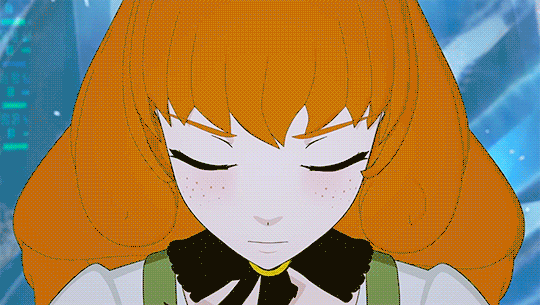

Penny receiving the Maiden’s powers from Fria is important on multiple levels and it plays on Penny alluding to Pinocchio. Fria (The Blue Fairy) recognizes Penny as a real girl, something she has been struggling with since the beginning:
Penny: Ruby... I'm not a real girl.
And is still struggling with:
Cinder: I don’t serve anyone. And you wouldn’t either, if you were built that way.
That said, Penny is not only struggling with enemies that consider her a robot, but also with the (understandable) overprotectiveness of people who love her:
Pietro: I lost you before. Are you asking me to go through that again? No. No. I want the chance to watch you live your life.
Penny: But dad… I am trying to.
She is not only a robot, who wants to prove she is a real girl, but also a daughter, who wants to grow into her own person.
This idea is made even stronger by Penny having been “created” through Pietro’s aura. She is a part of Pietro becoming someone completely different and independent from him. Still, isn’t it what all children are?
Raven is instead Penny’s opposite since she is not a daughter, but a mother. Not only that, but she is a mother, who fails three times.
She fails her biological daughter Yang by abandoning her and putting her in danger.
She fails Vernal, who dies for her.
She fails the previous Spring Maiden, who clearly looked up to her and was betrayed:
Cinder: Vernal was a decoy the whole time. The last Spring Maiden must've trusted you a great deal before she died. I bet that was a mistake...
This is well conveyed by Raven’s case being the opposite of what should ideally happen. Normally an older Maiden should pass her power to a younger girl, so that the cycle keeps going and that a new generation can keep fighting for good. However, Raven steals the powers of the Maiden for herself, just like she uses her shape-shifting ability for selfish objectives:
Ozpin: Everyone has a choice. The Branwens chose to accept their powers and the responsibilities that came with them. And later, one of them chose to abandon her duties in favor of her own self-interest.
She presents herself as a mentor for young women, but in the end she is a failure because she is too self-centered.
In conclusion, Rwby is both a coming of age story and a story that deals with cycles. Let’s think about the many abusive cycles in the story or the damaging cycles present in society, for example. All these cycles need to be broken and I would not be surprised if this will be the case for the cycle of the Maidens as well.
THE CHOSEN ONES
Up until now, the person who should be a Maiden never becomes one.
a) Pyrrha was destined to be the Fall Maiden, but Cinder stole the power.
b) Vernal is foreshadowed to be the Spring Maiden, but Raven turns out to be the real one.
c) Winter has been preparing herself to inherit the Winter’s Maiden’s role, but Penny is the one chosen by Fria.
Why is that so?
The story is clearly playing with the idea of the “chosen one” and asking some questions.
Are people chosen by destiny:
Cinder: It’s unfortunate you were promised a power that was never truly yours.
Or do they choose it?
Red-Haired Woman: She understood that she had a responsibility… to try. I don’t think she would regret her choice, because a Huntress would understand that there really wasn’t a choice to make. And a Huntress is what she always wanted to be.
What if the chosen person is the wrong one?
Lionheart: She was determined, at first, when she inherited her powers, but the weight of responsibility proved to be too much for the child. She... ran. Abandoned her training, everyone. That was over a decade ago. There's no telling where she could be now.
Finally, is it even right to choose a person?
Weiss: Doesn't it bother you? He practically groomed your entire military career.
Winter: It did at first, when the General first proposed it to me. But the more I thought about it, the more I saw it as a privilege, a chance to do some real good for Atlas. For Remnant.
Weiss: But your destiny was chosen for you, without your input.
So far each Maiden has explored this concept in a different way. Moreover, the story has highlighted many problems with the method used by Ozpin and his allies to select their guardians.
First of all there is the machine used to transmit aura:
Ironwood: We've made... significant strides. And we believe we've found a way to capture it.
Qrow: Capture it and cram it into something else. (gestures to Pyrrha as she takes a second to realize what that means) Or in your case ...
Pyrrha: (to Ironwood) That's...
Ironwood: Classified.
Pyrrha: ... wrong!
This method has been presented in-universe as sketchy and unethical both for the person who is having her aura taken and for the person receiving it.
It is also interesting that this machine is basically the technological equivalent of the Grimm used by Salem and Cinder to steal the powers in the first place:

One is the product of destruction (The Brother’s Grimms), while the other is the result of creation (in-universe technology is linked to creation). However, they both do essentially the same thing. They steal another person’s aura and change the one absorbing it:
Raven: You turned yourself into a monster just for power.
Secondly, there is the fact that so far several Maidens have died or have been targeted in horrible ways.
Some of them were specifically attacked because young and less experienced than others, like Amber. Some others made their choice without truly understanding it, like the Spring Maiden. And some of them. like Pyrrha, were not even given all the elements to make an informed choice.
In short:
Hazel: You send children to their deaths for a cause that you know has no victory, no end!
It is true that Hazel is a hypocrite that feels anger for Ozpin sending students to their deaths only to be the one killing them. It is also true that he does not respect his sister’s choice:
Oscar: Did she know the risk of being a Huntress?
Hazel: She was only a child! She wasn't ready!!
Oscar: She made a choice! A choice to put others before herself! So do I.
However, the narrative harshly criticizes Ozpin for not giving people all the information, “the knowledge”, they need to make that choice:
Yang: There was so much you hadn't told us! How could you think that was okay?!
Finally, we arrive at the current volumes where we see how Ironwood has tried to control Penny, Winter and Fria aka all the three people involved in the passage of the Maidens powers...only to fail miserably.
And in this failure probably lies the true mistake which has been made over and over again. The whole point is that probably the whole cycle (thematically) can’t and should not be controlled to this extent:
Goodwitch: At first, the only thing that was certain was that the powers were specifically passed on to young women. But as time went on, it was discovered that the selection process was much more... intimate.
Pyrrha: ... Intimate?
Goodwitch: As we understand it now, when a Maiden dies, the one who is in her final thoughts is the first candidate to inherit her power.
The powers are passed from a person to another through emotions. It is not by chance that the last person in a Maiden’s mind is the one who gets the power. It is because the power is linked to emotions and to ties and you should not try to weaponize them.
MAIDENS AND RELICS
Finally each Maiden is clearly linked to the theme represented by her respective relic.
Pyrrha and Cinder are both linked to the idea of destiny and choosing. I have shared some thoughts on them here.
I would say that Cinder wants to be chosen. She wants to be special and to be given value. This is probably why she is serving Salem. It is because Salem has chosen her for an important role:
Salem: When I chose you as my vessel for the Maidens, I put my trust in you.
This is not positive. It is dehumanizing:
Salem: This game is not yours to win, Cinder, it’s mine. Just because you’re more valuable to me than a pawn, does not make you a player.
But Cinder sees this as a chance.
Pyrrha is instead a person, who chooses her own destiny:
Pyrrha: When I think of destiny, I don’t think of a predetermined fate you can’t escape. But rather… some sort of final goal, something you work towards your entire life.
In other words, Pyrrha has an active role in her own destiny, while Cinder so far has accepted it passively.
This might seem ironic because all in all Cinder has been a pretty active character. She was born as nothing and fought to free herself and to become more powerful. However, she is still leaving her own life in the hands of another person, who is specifically coded as an abusive mother-figure. It is probable that her arc will be about taking back the agency Salem is clearly stealing from her.
This might very well be why she is the Maiden of choice. It is because in the end she’ll make an active choice to get her own freedom back.
At the same time, Pyrrha being active in her choices still leads to her demise. This is because she represents a choice without knowledge, as I have stated in the meta linked above:
She had been explained only a fragment of the truth, while the whole point is that one should learn, meet creation and destruction and then make a choice. This is why we have yet to meet the relic of choice.
As a matter of fact it is clear that knowledge and choice are complementary, just like destruction and creation.
This is highlighted also by their respective relics. On one hand the Lamp offers knowledge of the past. On the other hand the Crown gives its user a vision of a future choice.
This is because one has to know the past to change the future:
Bartholomew Oobleck : History is important, gentlemen! If you can't learn from it... you're destined to repeat it.
In a sense, knowledge is the passive condition of choice, while choice is the active goal of knowledge.
This is why one needs both to contribute to the world in the most effective way possible. If one acts without knowledge they might make the wrong choice. At the same time, knowledge without choice is just passiveness, as shown in The Indecisive King fairy tale.
Too much knowledge might lead to indeciveness or even cynism. This is why Raven is the Spring Maiden. It is because she is Pyrrha’s opposite aka knowledge without choice:
Yang: Which is it, mom? Are you merciful, or are you a survivor? Did you let me walk into that trap because you knew I could handle it, or because it meant you could get what you wanted?!
Raven keeps making decisions only to run away from them immediately after. Knowledge did not make her braver, but just a coward.
Finally we arrive to Penny and the idea of creation.
I have mentioned Penny in the meta linked above:
Penny is an artificial human, a creation who was given life because her father loved her so much that he sacrificed a part of his aura for her… twice. She is at the centre of the theme of creation and it represents the good sides of it. She is a creation with a soul, a child, the fruit of parental love. It is because of the love she received that she is willing to protect creation.
Penny is at the centre of the theme of creation in two ways.
a) She is a child, who wants independence.
b) She is a good declination of technology.
On one hand children are new lives that join the world. They are the embodyment of creation.
On the other hand technology is an expression of human creation and a way humans have to change and influence reality.
Penny is both. She is Pietro’s girl and a robot with a soul:
Pietro: When the General first challenged us to find the next breakthrough in defense technology, most of my colleagues pursued more obvious choices. I was one of the few who believed in looking inward for inspiration.
Ruby: You wanted a protector with a soul.
Pietro: I did. And when General Ironwood saw her, he did too. Much to my surprise, the Penny Project was chosen over all the other proposals.
Ironwood choosing Pietro’s project over others is very interesting and ambiguous. Did he choose this project because at the time he understood the importance of “a protector with a soul”?
Probably consciously yes, but the way he has treated Penny since volume 2 suggests also something different. It suggests a desire of domination. The idea that putting a soul into a metallic body would make it easier to control it.
After all:
Ironwood: For the past few years, Atlas has been studying Aura from a more scientific standpoint; how it works, what's it made of, how it can be used. We've made... significant strides. And we believe we've found a way to capture it.
Each one of humanity’s gift has another side of itself. Knowledge can lead to fear and choice is linked to passivity/agency. When it comes to creation, this gift brings with itself the temptation of control.
Why shouldn’t a creator “own” theis creation? Why shouldn’t they be entitled to it? Why should they share it with the rest of the world?
If one looks at Ironwood, at Atlas and at the other protagonists of this volume this way, a lot of things resonate.
Atlas is the most technological advanced kingdom, but instead of sharing its resources it closes off. Ironwood’s embargo is just another declination of this same idea of losing control.
Similarly the Ace Ops and Winter are all repressing their emotions. They want perfect control over themselves. They are taught they should be like drones.
Technology itself is often misused by the characters. Technolofy should be like Penny. It should have humanity and a soul, but Ironwood likes it because he sees it as something logical that can be controlled (and of course he keeps losing control over it). Ironwood wants to become like he thinks Penny is aka a controllable soul. He fails to understand that Penny is special because she has her own free will.
Finally, this same desire of control is present also in familial relationship. It is not by chance that the Schnee Family is in Atlas. Weiss’s story has always been about exploring this specific idea of a family. A family, which is cold and controlling, just like ice. Weiss’s arc is about melting this ice, in herself first and now in others as well.
Technological control and the control of people. In short, the control over two aspects of creation. This is the the idea Atlas represents and this is why it is currently falling.
In short, the creation must be free and it is not by chance the world is in its current predicament because the Gods tried to control their creations with disastrous results.
CONCLUSION
These are my main thoughts on the Maidens so far. That said, they might chance since the story is far from over as the arcs of all the maidens we have met so far.
As a final note, I find interesting that so far none of our four protagonists is a Maiden. It is an interesting choice and I think that it lets the series make a good use of its ensemble cast.
That said, I wonder if our four protagonists will end up calling back the original Four Maidens instead.
The fairy tale is interesting on multiple levels.
In-universe, it is interesting because it tells us something about how Ozpin was probably inspired by the original Four Maidens to try to save the world again. Ozpin is inspired by four normal people, who are just trying their best to help others.
This is a recurring idea in Rwby and this might be why none of the four protagonists has been selected to be a Maiden yet.
If read as a stand-alone, the story is an interesting tale on how to overcome depression.
The story starts with the old man closed in his house and it shows how he progressively opens up until he himself is able to help others.
Winter is the one who teaches him how to work on his own interiority even when the world is cold.
Springs prepares the terrain for him to come out. It makes the garden more welcoming. It is like when a person has to find the right environment to open herself up.
Summer is the one who finally drags the man out and gives him energy.
Finally Fall is the one who makes the man realize he can now share his new found energy with others.
Theirs is a virtuous cycle and I would say it is very different of the tragic cycle that sees the current Maidens as protagonists. Who knows? Maybe it is about going back to that virtuosity.
Thank you for the ask!
#rwby#rwby meta#maidens#cinder fall#raven branwen#penny polendina#pyrrha nikos#asksfullofsugar#anonymous
187 notes
·
View notes
Text
Empty Masks
The Phantom of the Opera and Social Dynamics of Exclusivity
(or: an essay I will never have an academic excuse to write, but shall anyway, because I watched The Phantom of the Opera tonight and i need to get this out of my system)
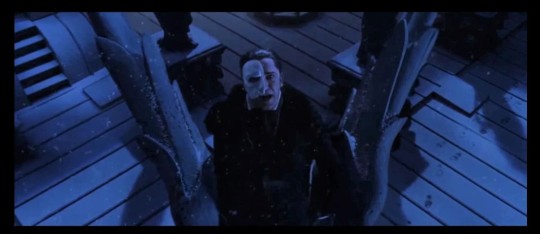
I can’t express just how desperately I want to be the Phantom. The strange, half-human ghost hidden under a mask, with a billowing cape and an opera house to hide his secrets, snow-covered stone gargoyles hiding him from the streets when he ascends to the roof and sings to the cold, bright stars. His would-be bride, the ethereal maiden entranced and led down into those secret places, where dark spires arc overhead and dark water flows away beneath the prow of the boat the Phantom, her would-be lover, steers.
But therein lies the problem: we are not meant to wish we were the Phantom.
The Phantom is meant to be a stranger. He is, after all, inhuman. It’s in his names: angel, demon, monster, ghost. He is not a man. He is more, and less. He is altogether other, and while we may sympathize, we are never meant to see ourselves in him.
And yet.
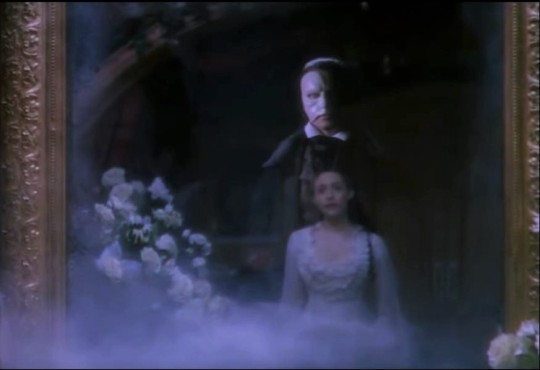
Because the thing about alterity is that there are far, far more of us than there are “meant” to be, the ones who see ourselves not in the heroes but in the villains of such tales. We, the queer viewers, the POC, disabled and disfigured and neurodivergent watchers and everyone else that lives on the margins of polite society—we do not see ourselves in the heroes. We are not only invisible in the ranks of the righteous: far, far too often, we are (implicitly or overtly) represented as the villains, the monsters, precisely because of who we are. Of what we are.
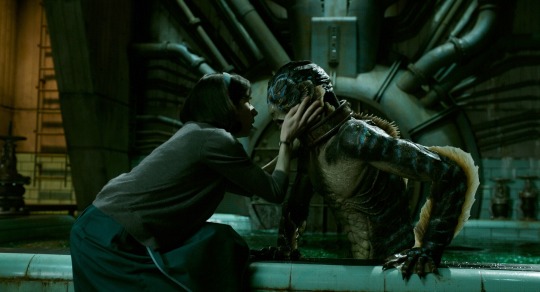
And that’s why the Shape of Water hit so hard for so many people, and why we’re seeing so many reimaginings of Lovecraftian horrors as something sympathetic, something good. Because so many of us have only ever seen ourselves in the monsters. We aren’t the people fleeing in fear and being reassured by the death of the creature; we are the creatures, watching our counterparts die again and again, in a thousand different ways, with a thousand different justifications. We are the monsters, cast out for things we can’t control.
But, of course, that is unjust. Even the heroes could see that. There must be something else, some justification, a reason we deserve to be slain. And so every dragon-slayer tells tales of the stolen princess. Every story with a monster makes sure to establish that the monster is dangerous and evil, ruined inside and out.
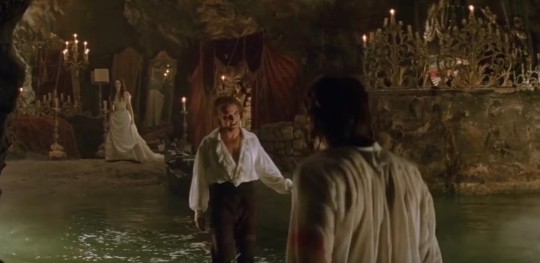
The Phantom is a murderer, and so he deserves to be unmasked. We are meant to understand that the two are inextricable: the face the mask hides is the murder the man commits. Even as Christine sings that it is “no longer” his face she is repulsed by, but his “soul, in which the true distortion lies,” we know that the accusation of “murderer” is always preceded by, caused by, the more heinous accusation: “monster.”
The Phantom’s wickedness is an excuse. His murderous inclinations, his possessiveness, the “evil” characteristics that are narratively traced back to his childhood and the way he was treated—they are used to justify the way he is robbed of his mask before a crowd, the way he’s ripped away from his longtime home in the secret twists and hideaways of the opera house.
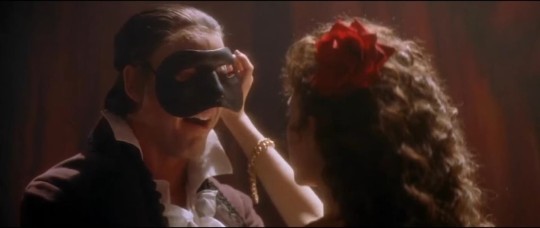
I had a visceral reaction to that scene, where Christine unmasks him. It hit too close to home. To have something that was kept so carefully hidden, something that, if revealed, could be so catastrophically dangerous—to have that be revealed, against your will—and by someone so intimately close to you? Someone you trusted, body and soul?
It felt like watching someone getting outed.
And, in a way, it was. The Phantom’s face was revealed, and it was as relevant as gender or orientation to his evil acts, and yet all the narrative repercussions still tied it inexorably, inextricably, into his villainy.
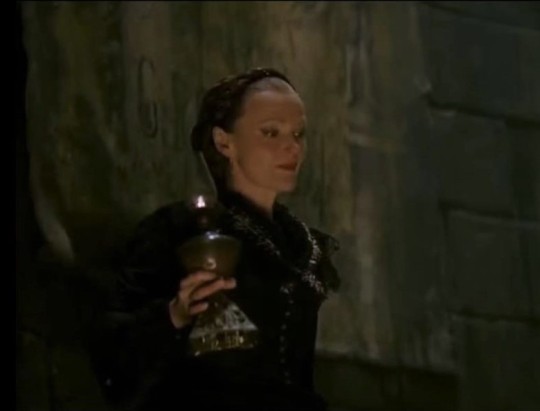
“Keep your hand at the level of your eyes,” Madame Giri says, and it is because his weapon of choice was a noose; it is because his face is a curse to behold. The Phantom’s violence is caused by his face. The Phantom is evil because of his face. The Phantom is a monster because he is evil—because of his face.
And that’s the rub of the Gothic genre, of horror that makes ordinary people monsters (of societies that ostracize its members for being “monstrous”): there is no place for the people that don’t belong.
The Phantom escaped his original prison (a captivity which has its own signifiers of racism and dehumanization—making very human monsters out of another oppressed people, this time the Romani—but that’s a whole essay of its own) and donned a mask, because his face made him a monster. He put on a mask of his own accord, perhaps, but he also didn’t have a choice. He couldn’t look in the mirror without it, not after everything he’d been told. He knew what made him a monster. He couldn’t change his face, so he tried to hide it. He was made to wear a mask.
It was not enough. There does not exist a mask behind which we will not long to look.
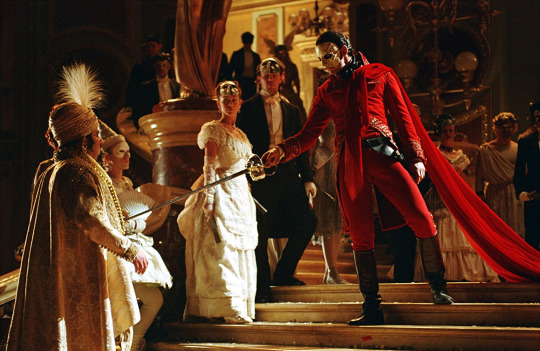
“Masquerade” is a masterful scene that shows the different layers of social exclusivity. There is the ballroom full of upper-class mask-wearers. Everyone there is unrecognizable, hiding behind their costumes. It is perfectly choreographed. It is perfectly gilded. It is entirely, divinely, grotesquely perfect. It is false.
A few floors lower, the servants and lower-class players have their own party, carousing and laughing with unbrushed hair and wide grins. They wear no masks, and feast on sour beer and stale pastries. They wear no masks because they can’t afford them. They are not permitted to be seen, but nor are they permitted to hide behind the masks of the rich. They make do. They celebrate together, because none of them have any masks, and that makes them friends, at least for the evening. They are forbidden from having masks, and so—if they stay in their proper place—they need none.
The Phantom has not removed his mask in years.
Even then, it is not enough. The room of the rich falls deathly silent as he appears in their midst. He cannot blend in among them. He cannot dance. He has not the patience, anymore, to try. He wears his mask, and at least they cannot see his face beneath it.
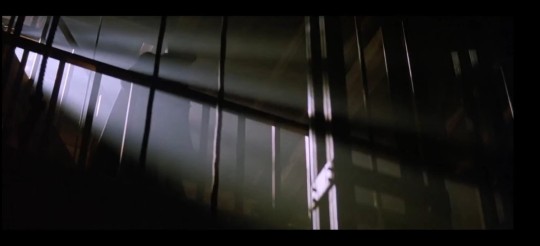
They fear him, not because he’s a monster, but because he is a mask. They want to know what’s behind it. They want there to be nothing at all behind it. The Phantom is a mask, and the person behind it is a blemish. They put up with him when he is invisible except for a shadow, a flash of white plaster and black cloak in the night. They can pretend there is not a person behind the mask. It’s a ghost. They want it to be a ghost.
It isn’t a ghost.
And when the mask is ripped from his face, when the person behind it is revealed to be human, even then perhaps they could go on; but he isn’t the right kind of human. He’s physically disfigured. He isn’t human at all. He’s a monster.
They hunt him like one.
There is no room in their world for a person that looks wrong, even one that hides behind a mask.
There is no room in their world for monsters.
(The monsters listen, and hold our masks a little tighter.)
#linden's originals#linden writes an essay#if anyone wants to challenge the idea that his appearance is directly the cause of his violence in and outside of the story#i can provide a supplemental argument but i don't feel like verbalizing it all right now#something something origins something options something#obv he 'had' a choice to Not Kill People but he's a character - the fact that he was written as a murderer#and his impetus to become a murderer was tied into his mistreatment#at the hands of a romani person and with the widely agreed-upon justification that he was subhuman bc of his face#yeah#whatever the conclusion sentence of that is#you know what i'm saying#if ur reading this wow ilu you're the real mvp here#thank u friend u are so cool#wow i did bother adding pictures to this gosh i love this movie so much#look friends i can love the gothic genre and hate it in equal measure for the same reasons#is it inherently ~Problematique~?#sure#so's pretty much everything especially in such a dysfunctional society with such an apocalyptic history#at least it's got style#at least it offers me a space in which my monstrosity is darkly - tragically - beautiful#at least it mourns the fate of the monsters (even though we aren't supposed to)#The Phantom of the Opera#gothic literature#meta#literary analysis
43 notes
·
View notes
Text
The “Penny Getting Hacked” Theory
Alright so, I know a lot of people aren’t too fond of this theory, and honestly, I’m not much of a fan either; since Penny’s entire arc has been about how she’s a real girl and always has been, and her getting hacked would just feel like it was negating all that development.
HOWEVER! I still think that the theory that Penny will get hacked still has merit to it, and that it still has a chance of happening, and here’s why:
Ironwood doesn’t consider Penny to be a real person. Sure she has an aura, but he still sees her as a machine, not a human being. We can see this by how he treats her throughout volume 7, and the series as a whole. Ironwood is very controlling of Penny from the very start and isolates her from her peers, claiming she “doesn’t have time” for friendships. He also says during ‘Cordially Invited’ that Penny is “completely under [his] control” which clearly shows how he fundamentally thinks of Penny as just another piece of Atlas tech and not a human being.
Essentially: Ironwood sees Penny as a robot and not a person. This is where the hacking idea comes in. People can’t be hacked, robots can.
[SPOILERS FOR VOLUME 8 FROM HERE ON]
As we’ve seen in v8e2, Watts has been taken away from the prison block where him, Robyn, Qrow, and Jacques are being held, most likely to see Ironwood. From the intro we know that Watts is going to be involved with Pietro and Penny this volume and alongside the ominous shot of Penny’s eye narrowing and turning red in a later part of the intro, its a fair speculation to think that Penny will be hacked by Watts on Ironwood’s orders and turn against the heroes.
What I think is going to happen is this: yes, Ironwood is going to ask Watts to hack Penny so that he can have access to the staff and launch Atlas into the sky, AND have the power of the winter maiden on his side without question, in exchange for whatever Watts wants (or he just holds a gun to his head, it could go either way at this point). And Watts will agree and try to hack her.
My favourite outcome, (but unfortunately unlikely given the evidence) for this is simply: It won’t work.
People can’t be hacked, and as we’ve established many times over, Penny is a person, even if she has nuts and bolts instead of squishy guts like the rest of them. She’s a conscious being with free will and personal feelings, and no matter how hard he tries, Watts can’t find a way to gain complete control of her. Penny will be aware that someone just tried to hack her, most likely Ironwood, and it will be the last nail in the coffin of her dying loyalty to Atlas
A more likely option here is that it could half-work; combining Penny’s already present guilt and crisis of identity and loyalty with a bug of some sort to push her even further into turmoil, maybe giving her intrusive thoughts and growing doubts about her friends. However if this happens I’d like for Penny to be aware of the bug and actively try and fight against it, in an effort to not lose her humanity and autonomy. And if the bug takes over and Watts can control Penny, it could end up with a classic “I Know You’re In There” fight on the outside where team RNBW are trying desperately to get Penny back while also trying not to hurt her and also not to die themselves, and a “Battle inside the Mind” where Penny fights through the bug from within (probably as a cool symbolic inner fight scene)
Of course, there is also the option that it does work, but if this happens I’d still like for the Real Penny to be conscious within her mind, trying to fight off whoever is controlling her. And of course, Penny being a completely dehumanized shell of who she once was would be scary and wrong and heartbreaking as hell and it’d actually be a brilliant motivator for Winter to defect from Atlas, after seeing what Ironwood has done to her friend (though she is most definitely having doubts already but this would be the last straw). This option would also most likely lead to an “I Know You’re In There” fight, but make it even More heartbreaking and tense because she’d be under complete control of the General (calling back to Cordially Invited and showcasing that this is Not Penny) and it’d be uncertain that Penny could be snapped out of it.
Anyways, tl;dr: Penny getting hacked could go a number of different ways, (if it even happens at all), but it will Probably be heartwrenching.
#rwby#rwby 8 spoilers#penny polendina#rwby volume 8#post script! these are just my opinions and thoughts!#i'd love to hear other opinions too!#also i have no idea if this is coherent at all#literally just dumped my thoughts into a post#can you tell penny's my favourite character#bonus for my nuts and dolts heart: ruby's the one who gets through to her in the I Know Youre In There fight
17 notes
·
View notes
Photo

“The first peace, which is the most important, is that which comes within the souls of people when they realize their relationship, their oneness with the universe and all its powers, and when they realize at the center of the universe dwells the Great Spirit, and that its center is really everywhere, it is within each of us.” ― Black Elk
I heard the phrase “you are the Indians now” over three decades ago.
I do not remember exactly who said it, I think it was in a conversation with Russel Means, if was said in a speech or to me privately, but that does not matter much. I heard it the other day in a commercial Hollywood production, “You are the Indians now” and realized that industrial colonial commercial America was finding one more way to take the strength and power out of the words we need to survive. When a phrase is taken out of human context it begins to lose its power. When a thing is commercialized it quickly become trite.
We must understand that this phrase, “you are the Indian now” actually does have meaning and power. It is a reality we all need to understand as we are demeaned, bullied , locked down and social distanced by those we have given economic, military and political authority to – what Eisenhour called “the military industrial complex”. To understand this all we need to do is look at how the authority of the military industrial complex that stretches back through American history has been used to the “profit” of the few at the expense of the many.
America was opened by the ever-expanding greed of the Euro-Asians. The Spanish who had recently broken the rule of what they considered an occupying Afro-Asian power, Islam, began to assert itself and in its assertion of its power created the voyage of Columbus not as a voyage of discovery but as a voyage of economic power and expansion. Columbus’s voyage was quickly followed by Cortez, Pizzaro and a multitude of the leaders of Spain’s military industrial complex. ( Even though this term had not been invented yet it is the appropriate shorthand for those who would rule.)
Push forward barely 300 years and South America, plundered as thoroughly as the Spanish could in their own areas of captured authority saw another economic power create a myth of shaking off the plunderers to the north, the English, and form a new “non colony” colonial power.
It was a strange combination forces that created the United States – men of considerable economic authority created an economic war but based upon human principles of freedom and self-governance. The reality is they laid the foundation a great colonial power. They used the power of myth and spirituality to unite the colonials and in time won an economic war against the mother corporation. These were smart men and oddly sincere, with possibly only Jefferson understanding the dangers inherent in the authority of economic power. Jefferson spoke strongly about not giving economic power and control to bankers, yet Hamilton did, and created the source of the force that was to colonize north America through the military industrial complex that slowly grew, in it’s need and greed for land and all the resources it contained – animal, mineral, lumber.
“So Indian policy has become institutionalized and the result has been that American people have become more dependent on government and that the American people have become more dependent on corporations.” ~ Russell Means

The devastation that followed for the American Indian nations was total and it was accomplished at first by outright war and disease and later by confinement, control of movement , isolation and most of all by breaking the power of the spiritual structures of each community that was conquered. This occurred in America while the European economic powers did the same to Africa and Asia.
It is important to understand that behind all this “colonization” were corporations – powerful economic institutions controlled mostly by men, institutions built upon the love of “growth, development, money, possession” feeding their narcissism. These were and are men (and women) who truly believed that they were creating a better world though pillage of communities around the world and breaking the local social and spiritual systems they encountered.
And today – here we are again.
The corporations are supporting political authority that use that authority to again break people to the will of the power of corporate economics.
Do not be fooled by thinking that the corporate war between Donald Trump and the Globalists is in your interest. It is a war about who will control the economy of the world. And it is not a race war – though the corporatists want you to think that. The heads of the corporations are as much Chinese, Arab and African today as they are American, French , Swiss and German. Race becomes the bait for the conflict which allows them to distract us while they remake the few institutions, we have that are foundational for us to not all become slaves to their consumer machine. And just as they did with American Indians, African and Asians, one of the fundamental tenets of corporate power is that we need to be separated from the land and from each other and the social and spiritual cohesion that healthy societies have.
Are these people knowingly evil? Not really . Well maybe some are.
They do meet together at places like Davos and the G – summits, however many are part of the economic powers at the moment and discuss how to wring the greatest “wealth” for themselves out of the earth. Do not think for a moment however that they are really concerned for your welfare other than as a commodity which they can exploit.
The activist/poet John Trudell says this well –
“It’s like there is this predator energy on this planet, and this predator energy feeds on the essence of the spirit.”

The worldwide lock downs have crushed the poor, increased domestic violence, suicide and fear. We all know this – at least those who continue to not trust a government that they understand is the hand maiden of the industrial/commercial/ colonial ruling class.
“The darkest secret of this country, I am afraid, is that too many of its citizens imagine that they belong to a much higher civilization somewhere else. That higher civilization doesn’t have to be another country. It can be the past instead—the United States as it was before it was spoiled by immigrants and the enfranchisement of the blacks. This state of mind allows too many of us to lie and cheat and steal from the rest of us, to sell us junk and addictive poisons and corrupting entertainments. What are the rest of us, after all, but sub-human aborigines?”― Kurt Vonnegut

This has played out it the media as a racist battle, but it is no longer, if it ever was, about race. It is about exploitation. It is about breaking the populations of the world into a weakened consumer serving class.
The economic authoritarians have used a broken economic theory, socialism, to create turmoil with its false promise of a new age and we, now educated by the schools they took control of fifty years ago,creating a watered down curricula that discourages thinking and enhances emotion, have used Marxism to create a fundamental break in our society. The people founding and running BLM are as much operatives for the colonial driven Chinese oligarchy as the Chinese scholar spies in our universities. But again, it is not just the Chinese nor just rich white people – it is the authority class – those who control the flow of information as well as the power of the ability to work.
We are all Indians now, and African and Asian who have felt the power of the colonial might of the corporations to lock us in our homes, to cover our faces live oppressed muslim women, to comply out of fear.
Colonialism is not new, and it is not white, though its latest historic manifestation was white beginning with the Spanish rape of central and South America. Colonialism is historic, it does not know race – it is when one people believe they have the right and the authority to use other people to gain wealth for themselves. The Mongols who swept out of Asia into Eastern Europe and India, the Muslims who charged out of Arabia and north Africa were as much colonizers as the Persian , Romans, Greeks, Egyptians. The real tool that all colonizers use is the dehumanization of other men women and children and create them as commodities either on the slave block or on the corner of the block talking about the latest phoney fad created in shoes.
When one looks at world history there seems to be a certain inevitability to this colonial oppression.
There is really only one hope and that lies in the spiritual path of turning to a larger power than all of us whether we call it god, grandfather, mother earth – and becoming fully human in our relationships. To do that means we turn away from consumerism and turn toward our relationship with all life that we share on this earth. And we fight back, we refuse to surrender our individual faces, our shared life and death and grief. Although the churches, mosques, synagogues and temples have at times been as much of the problem as the solution the fact that those in authority do not want us to gather there speaks volumes to the power of the spiritual life and the need to gather there to good purpose.
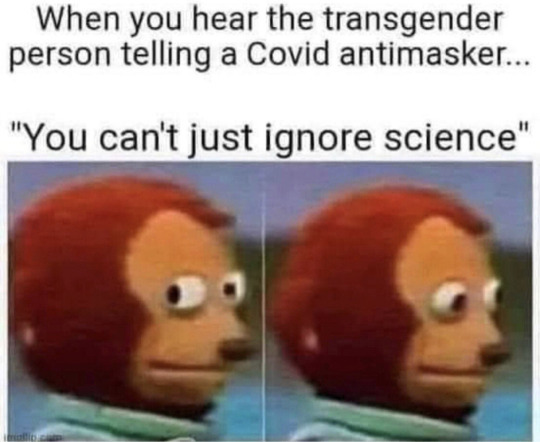
Again John Trudell - “We have power… Our power isn’t in a political system, or a religious system, or in an economic system, or in a military system; these are authoritarian systems… they have power… but it’s not reality. The power of our intelligence, individually or collectively IS the power; this is the power that any industrial ruling class truly fears: clear coherent human beings.”
3 notes
·
View notes
Note
Very great analysis on how bleak the cycle can be. What’s your take on how the cycle works regarding other villains, like Vaati, or Majora?
So I know you asked about the cycle in-universe, led here I would guess from this post, but there’s a noteworthy followup I made in that vein here, and that’s important context to how I feel about a lot of the Zelda rogues’ gallery.
Because the thing is, if you go looking for qualities to hate, you’ll always find them.
Ghirahim invades Link’s space in a way that feels- to me- very gay panic. He talks in luscious detail about wanting to do violence onto Link’s person. He threatens to run through his subordinates.
Zant creeps on Midna at a major part. And, Zant’s very easy for me to relate to and want to defend, because the big other thing used to make Zant seem “scary and off-putting” is his literal autistic meltdowns. They may not be called that by name, but Zant thrashing, bending weirdly, the noises he makes and slamming his head on the floor when frustrated and overwhelmed, as an autistic person, I recognize intimately. I can’t even say it’s that much of a caricature of stimming and meltdowns.
Vaati kidnaps “beautiful maidens”. We’re given plenty of reasons to hate them.
My beef is, a lot of these issues feel petty- not in their in-universe damage done, but petty in a writing sense.
Hearing that Ghirahim controls the bokoblins through threat of force is basically meaningless. We can’t really be all up in arms that Ghirahim is threatening to stab bokoblins because in that cutscene alone we tear them apart en masse ourselves. We can have the excuse that they’re our Enemies, but they’re Ghirahim’s subordinates, but really, how much of an excuse is that? Yes, there’s a difference between stabbing enemies and stabbing allies, but The Legend of Zelda is not a work that has any kind of moral high ground to point fingers about dehumanizing people. We’re not even dignified a response from the Bokoblins. You could omit Ghirahim’s threat entirely and nothing about that scene’s weight or context would change.
Zant getting uncomfortably up in Midna’s space is just supposed to be a cruelty that make us feel more justified when Zant dies in a comparatively graphic and painful-looking manner. They are not used as meaningful characterizing moments. It doesn’t illustrate that Zant wields cultural power over Midna, because in their dynamic, both make clear that Midna was the favored one- she was chosen to rule- while criticizing Zelda, she alludes to having a life of luxury herself (since she’s projecting her own issues onto Zelda in that scene) while Zant at least perceives himself as having lived a tortured life and Midna doesn’t contradict him or call him a liar, merely insists that he was power hungry and that’s why “everyone” felt justified turning away from him.
It doesn’t indicate Zant really wants Midna because it seems to just exist as an opportunity to set up Zant attacking her for siding with the light world. It doesn’t even really indicate Midna’s character growth because she doesn’t seem to seriously consider Zant’s words and she never suggests in the past she might’ve gone along with him.
The thing about The Cycle and it’s cruelty is that it’s something that exists halfway in and halfway out of the fourth wall. Hyrule can’t stay at peace. It can’t be stable and happy. It has to be imperiled because they want to keep making games.
The villains in the Zelda series are created to fill a role. They’re boss fights. In that sense, they’re trophy bucks to be hunted down for our entertainment. You could arguably say the same thing about any video game boss, but, I would argue, a well-written game gives you reasons to find opposing this character meaningful.
The Zelda series does not do this.
The Zelda series mostly gives you some cheap heat excuses and a lot of vague words about how someone is Evil or Diabolical. Next time you fire up a Zelda game, just, stop and pay attention to the cutscenes and look at just how much of a given character’s crimes are: 1. vague, 2. only ever stated by other characters who already hate that character, 3. make no sense as a strategic move unless you intuit or assume a lot of information the game never tells you.
It’s really easy��to assume in the average game that Ganondorf- or Vaati, or Skull Kid, or Zant, or Ghirahim- is running wild killing people and burning the countryside. But if you actually look at it, there doesn’t seem to be a clear thesis to who’s hurt and who isn’t.
Why do the Zora get frozen? Why is Valoo’s tail attacked? Why does Zant attack Hyrule’s light spirits but doesn’t seem to spread the twilight to Snowpeak or the Gerudo Desert when they’re seemingly unprotected?
So the end result is you get split one of two ways. You either trust the Experience of the game- that tells you the entire countryside is suffering because of Vaati- and thus, you come up with explanations and cruel attitudes Vaati has that clearly explain all of his behavior- or you don’t, and then you sit there going “man Ezlo I know you’re salty over being turned into a hat and all, but isn’t it a little fucked up that you’re this willing to talk about your underage orphan apprentice like maybe it was an inevitability he’d go mad with power and there’s nothing to do but forge a sword and kill him?”
The game wants you to assume there’s no way to talk down or negotiate with any of these people. It tells you that there will be Dire Consequences if this person’s actions are not stopped.
But Vaati’s a child who wants power and doesn’t even seem to have a clear thesis of what he’s doing with it besides that he just vaguely wants to be ‘in charge’.
But Ghirahim seems to have never thought of himself as anything but an instrument and his parting comments to Link suggest that he is only, just, starting to actually feel any real standout emotion towards him beyond annoyance, and that emotion is not rage or revulsion but curiosity. He only really acts out of loyalty to an entity that on-screen, hurts him and literally dehumanizes him- turns him into an immobile object. Something we’re told is a tragedy when it happens to Fi.
But Zant talks at great length about how miserable he was, and Midna insinuates “everyone” hated him and thought he was shifty and untrustworthy, and in his own memories, he was sobbing alone and immediately latched onto and literally worshiped Ganondorf, for... telling him he was important and offering to give him power.
Much is made of Skull Kid’s loneliness and ultimately they’re just a kid, go easy on them, they were tempted by Majora- but we have no idea what Majora itself is, besides that they’re a mask, and in the entirety of Majora’s Mask, many discussions are made about how masks are the product of spirits filled with regret, and one must work with them to bring them peace- and Majora itself speaks in a childish manner.
Chancellor Cole, you can argue, even looks more like a “real evil” in that he’s a scheming bureaucrat who uses his position as a respected adult to talk over and endanger Zelda and Link, and even he’s thrown away by Malladus when the latter needs a free body.
The most in-universe explanation, going by just what Nintendo’s official lore tells us, is that Demise’s hatred seeks a suitable vessel, and Ganondorf is just its ‘favorite’, and it’ll happily latch onto anybody else in a position to screw over the heroes. But that raises a lot of questions and leaves a lot of things unaddressed.
So it comes down to a question of, what do we decide here that we trust? How many of these guys would stay enemies if we had any capacity to talk to them and understand their problems? So many of these guys feel like they’re trapped or hurting or miserable or just had a completely unspecified “hunger for power” because that sounds threatening, but the people who desperately want to feel strong are usually people who, for some reason or another, feel denied, repressed, or looked down on.
Basically, the characterization is vague, and mostly, we’re assured they’re evil by other people in the game. To me, this comes across untrustworthy, especially when, in effect, a lot of these characters talk or act like they were (or are shown to be) wronged somehow, and when the game seems to act as if your only options are “let them do whatever they want” and “kill them where they stand” with a clear insinuation that the murder is the right and proper choice.
Which is kinda the whole problem. The average Zelda game spends however much time it dedicates to the main villain, trying to tell you to kill them. This is at odds with Link as someone who engages with and helps a lot of people. And often “however much time it dedicates to the main villain” is not that much time at all! You’re often just, like. having a fun little happy adventure with a scattered handful of interjections of “so everything is the fault of this one guy, and, uh, you should stab them.”
#Legend of Zelda#readmore#the hour is late and I need to sleep#so I hope this is coherent#mrneighbourlove
87 notes
·
View notes
Note
Honestly, what I was hoping for was a sort of "Battle in the Center of the Mind" where Penny overpowers and destroys the virus with her boosted Aura. What I GOT was Watts HACKING A SOUL and Penny having to discard everything EXCEPT the bare minimum of who she is to SURVIVE! It's just... Seriously, CRWBY, way to vindicate literally EVERYONE who's ever tried to dehumanize Penny! I honestly think the only way they could go for a bigger slap in the face is if Blake got back together with Adam!
I really don’t see it that way. It doesn’t really “vindicate” that in my view. It very easily COULD have, but they did make it clear that this is just what she always was. It wasn’t really “hacking a soul” either, honestly I never really got that part? Mind control is a trope. It doesn’t really disprove her being a person? He didn’t rewrite her, he implanted a virus in her. And I GET how you can interpret that as the virus winning, but I don’t see it that way, and I don’t think it was INTENDED that way necessarily. They separated the two. I’d have prefer her stay mechanical myself, I’ve made that pretty clear, but I don’t think this is as awful as some make it out to be. Again, I DO think that you’re overthinking this. I get WHY tho. I’m not really into Kingdom Hearts, but you’ve not exactly made your feelings on THAT one vague. I think you’re letting what happened there affect your judgment of this somewhat. Assuming that it’ll automatically go THAT bad based on something that JUST happened.
Again, I GET IT, more than others would I think, but honestly I don’t think it’s NEARLY that bad. She’s still Penny. I don’t know, I don’t agree with EVERYTHING CRWBY does, but it’s still one of my favorite shows. I’d have preferred her stay mechanical, or a cyborg, but I can live with “energy spirit”. Better than if she DID just get plopped into a human body. I think Luimmy put it well in that “The Maiden of Creation creates herself” (https://luimnigh.tumblr.com/post/645560704516194305/see-im-actually-satisfied-with-what-happened)(not sure I 100% agree with them, but it’s a thing to consider and all that). And I can very much see how some trans people take this as a triumph. It’s a complicated situation. I still think that you’re severely overthinking this, but there ARE legitimate concerns here. All I know is, in my hundreds of fanfic ideas, I’m not 100% going to go THIS route, no. Still, I mean, it’s okay to be upset. I just hope I’ve explained why I can live with this, even if its not what I’d have done. The way they DID do it, tho, is in a way where they tried to make it clear that she already WAS real. This is who she always WAS. I can live with it, even if I’d have preferred her stay mechanical. I don’t know
This wasn’t malicious, it was-at worst-a case of not thinking through the implications. Or perhaps feeling beholden to follow old plans they made years ago, when they were different people. RWBY’s still one of my favorite shows, but no show is perfect (As an aside, a point of comparison: Steven Universe is still a great show and I appreciate all it did, but I think giving White Diamond a reformation type arc was a mistake. I’d have had her be the ONE person Steven couldn’t get through to, cause there’s some people you just CAN’T get through to. I still like Steven Universe, just something I’d have done differently. Not something done with malicious intent, but still a choice I personally disagree with. Y’know, it’s whatever)
Believe me, I REALLY dislike the whole “robot becomes human“ trope, but this isn’t QUITE that, so I can live with it. I suppose as someone who can really see the appeal of leaving your body behind... (is this dysphoria? Is that what this is? Look Idunno) I’m not saying you have to be 100% okay with this. I’M not. Just that I don’t think it’s THAT bad, y’know? I can live with it. I honestly think that you’re just overthinking all this. Which I get, cause I can be the same. I understand assuming the worst case scenario, irrational though it is. Cause I do that, far more often than I’d like. So, yeah. I’m NOT fully satisfied with this development. I like robots. Always. But I can live with it. I’m sorry if this came off wrong I never meant that I don’t know I’m tired and super anxious. As I said, I get it. I’m doing it myself rn. I’m sorry this is how I feel about it I’m sorry
0 notes
Note
Any thoughts on what the role of the Maidens are in the overarching narrative of RWBY. Because they are developed as characters and not as just keys to get the plot coupons of the relics.
conceptually the maidens represent ozma's dedication to the divine mandate, right. reading between the lines of the fairytale in context with what we know about how ozpin operates, it is pretty obvious that he empowered the maidens intending them to act as his agents in his crusade against salem. in this sense his present-day conspiracy's dehumanizing treatment of the maidens as relic-guardians is not a corruption of their "true purpose" but the extreme logical end result of what ozma made them to be.
with respect to ozma as a character, the obvious symbolic line between his four daughters and the four maidens suggests some things about how ozma might have viewed his own children—particularly if taken into consideration with 1. his abject horror when the eldest turned out magical without the blessings of his god, and 2. all four girls vanishing from the scene as ozma moves to attack salem, which presumably indicates he has no idea what happened to them after that point. we don't actually know why ozma tried to sneak the girls away that night, and the common assumption that he feared salem was a danger to them and went down fighting to protect them from her has some obvious holes (the girls are not shown during the fight, ozma isn't even depicted as fighting defensively at all, and when the smoke clears after the castle falls, salem's a pile of ash).
and then there's this in his commentary on 'the story of the seasons':
However, despite the prevalence of powerful wizards and witches in our fairy tales, the world has never known the levels of magic described here—for which we should be grateful. I fear that if unrestricted magic use were possible, the results would be chaotic and catastrophic. Better to leave such fanciful notions comfortably in the realm of fantasy!
given how ozma reacted to his daughter's magic, and how tightly ozpin controls the maidens, "unrestricted" strikes me as the key word here. the god of light told him that humankind was diminished, a mere fraction of what they once were, without the brothers' presence and ozma understood that to mean "humans can't have magic except by divine fiat" and his ideological view on magic is accordingly uneasy.
i think the narrative purpose of the maidens is to interrogate that discomfort: he created them by imparting his own god-given magic to young women he trusted to faithfully serve his divine mandate… and then he lost control of that power because it developed an inheritance system directly at odds with his intention. (if a maiden dies violently, and her killer is a young woman, the magic will most likely be inherited by her killer; and if she dies without a suitable candidate in her final thoughts, the magic chooses a new vessel in accordance with its own will. ozma cannot use the maidens to attack salem without effectively ceding that power to her. i am inclined to think that's precisely WHY the magic passes itself on in this manner.)
and of course the narrative thread connecting each seasonal arc is that the maidens are all in some way breaking free from ozpin's control: cinder kills him, raven walked away, penny chooses who she wants (winter) instead of making the pragmatic choice (weiss), winter leaves ironwood behind to fall with his city. by virtue of being the literal keys to ozpin's reliquaries the maidens are sort of the locus of his ideological failures; literally human beings reduced to objects.
(<- all of this is one of my reasons for thinking the branwen twins' shapeshifting is the key to whatever additional protections ozpin put in place to conceal the beacon vault.)
salem's side of this is also interesting in that she has always struck a rather ambivalent tone with cinder regarding the maidens: "your newfound strength brings with it a crippling weakness," "remember that it comes with a cost," and so forth. notably, her interest in the maidens is strictly in relation to the vaults, which have only housed the relics since ozpin's tenure as headmaster, and both ozpin and qrow have referenced circumstances in which the identity of the maidens became "unclear" (as opposed to maidens ending up under salem's control). i am unconvinced that salem cared about the maidens in the slightest before ozpin decided to link them to the vaults.
i do think there is probably a thread being developed here in regard to the ozlem girls, if only because the symbolic line is very clear (the original four maidens in the fairytale were sisters and their colors match the ozlem girls); i don't think the maidens are the daughters in any literal sense, whether whole or in part. the implicit similarity between ozma's exploitation of the maidens and his interest in ruby's silver eyes—when silver-eyed bloodlines originated from him—is probably telling. his implicit assumption that salem intended to use their daughters, coupled with his obvious projection of his own suicidal ideation onto her, likewise. we know that he lied to and manipulated salem throughout their marriage because the god of light told him she was irredeemable; to what degree would that perception of her color his relationship with their children?
<- the maidens are inextricable from this question because he made them by sharing his magic between four sisters whom he apparently, if the fairytale colors are any indication, emotionally associated with his daughters. and in the broader sense, the maidens represent the family he sacrificed on the mandate's altar; representations of his daughters that he can use as pawns in his crusade against salem.
there's also a more general purpose the maidens serve in relation to salem's "no victory in strength" thesis in that the point of a character becoming a maiden is not to Be Powerful, and in fact the maidens are all defined by their vulnerability:
amber is introduced in a coma pending extraction of her soul
pyrrha is coerced into becoming a vessel for someone else
cinder loses her eye and her arm as a consequence of becoming the fall maiden
the last spring maiden died under circumstances that have left raven emotionally shattered more than a decade later
fria is subjected to extreme medical neglect in a futile attempt to control her final thoughts
penny is mutilated, infected with a virus to strip her of agency, and ultimately murdered because of the maiden's power
winter receives the magic as a gift but spirals into guilt-stricken despair because she couldn't save her friend or her sister
all underscored by salem's repeated warnings that the power comes with a cost and various illustrations of how "godlike power" not only isn't a trump card but becomes a liability if treated like a trump card (see: amber vs CEM and penny vs ace-ops). so the maidens are an important building block in that theme as well.
22 notes
·
View notes
Text
Game of Thrones Prompts Lists
I decided to do another prompts list because I was going through my pinterest and saw all these prompts and stuff and I thought they would be perfect for a Game of Thrones prompts list. I will edit my regular list later this week. I hope you guys like them and you can use a prompt from this list and the other in the same request if you’d like. I will create other prompt lists for other shows and fandoms if you guys want that, I just really liked these prompts and knew they wouldn’t go with my other list.
Requests are open
Regular Prompts List
~~~~~~~~~~~~~~~~~~~~~
1. “Why can’t we catch the killer with the knife in their hands?”
2. “It’s hard to have a heart when you’ve stopped so many others.”
3. “War doesn’t determine who is right, it determines who is left.”
4. “Men go into battle. Women wage war.”
5. “You want a fight. I’ll bring a war”
6. “I trusted you.” “Well then you can’t exactly blame me, can you? It’s was your mistake.”
7. “She is a shadow of something you wanted; how badly you wanted it still drives you insane.”
8. “You don’t even know my name.”
9. “You will have to wade through blood to win this war.”
10. “The girl who destroyed armies.”
11. “Kill me if you must, but I shall not bow to a king who wears a crown studded with jewels of every life he has ended.”
12. “Be careful- no man that has gone in there has ever come back alive.” “Good thing I’m not a man.”
13. “Watch for her jagged edges, son, for she is no sweet and dainty flower to be held.”
14. “This isn’t going to be a war. It’s going to be a massacre.”
15. “Soldiers are to deal with enemies, assassins are to deal with friends.”
16. “Maybe I deserve all of this.”
17. “They’ll be talking about this war for thousands of years.”
18. “They know what I am. Let them come, if they find the courage.”
19. “You will not survive this war.”
20. “He/she is a weapon, a killer. Don not forget it. You can use a spear as a walking stick, but that will not change it’s nature.”
21. “Some people are just born with tragedy in their blood.”
22. “Oh, so you want a battle? I’ll give you a war.”
23. “What have they done to you? I don’t even know who you are anymore.”
24. “The king has lost his queen.”
25. “I’d kill a thousand men before I let one make me his slave.”
26. “I am not the innocent girl anymore.”
27. “I do not fight for a cause… I fight for a people.”
28. “Magic is neither good nor evil. Is a knife evil? Only if the wielder is.”
29. You are losing my interest and that is very dangerous.”
30. “I don’t miss.”
31. “What makes you so dangerous?”
32. “You are either with me or against me. I suggest you choose wisely because I’m more than willing to step on you than step around you.”
33. “I’m with him. For better or for worse.” “It’ll probably be worse.” “I knew that the day I met him.”
34. “I don’t expect you to understand and I don’t think I ever will.”
35. “The only good king is a dead king and the real king is the queen.”
36. “If you’re trying to be a smartass, first you have to be smart, otherwise you’re just an ass.”
37. “No,no,no. You can’t do this. Not to me. Not to any of us. Not to yourself.”
38. “I’m sorry. I just had to do something, anything.” “And you choose to do that?” “That’s what I was taught to do.”
39. “It’s alright to not be okay. It’s alright to break down and cry and thrown things. You can’t keep this in this long and expect not to hurt someone.”
40. “ I have never hurt anyone. Yes, I’ve killed and I’ve damaged but those are things that you can overcome. Mentally, however, I’ve harmed no one but myself.”
41. “I’m not a thief. I’m just really good at acquiring things that aren’t mine.”
42. “Oh, I’m a monster? Perhaps you should speak to me more softly then. Monsters are dangerous, and just now kings are dying like flies.”
43. “Oh sweetie, monsters are real and they look like people.”
44. “I pray you never take a breath without remembering the breaths you’ve taken away.”
45. “Sometimes memories are the worst form of torture.”
46. “Don’t give me attitude, darling. I have one of my own.”
47. “Once we were heroes but everything has everything has changed since then.”
48. “We are a new breed rising with fire in our eyes. We don’t fear anything because we’re already dead.”
49. “Your mistake was not in the hiding place. It was thinking you could hide from me in the first place.”
50. “You may fancy yourself safe and think yourself strong but you are mistaken.”
51. “I am ninety-nine percent angel. But, oh… that one percent.”
52. “In truth, you like the pain. You like it because you believe you deserve it.”
53. “Just because I didn’t inform you that I was helping does not mean I wasn’t doing so.”
54. “I don’t ask for anything from any of them or anyone. I take what I want, demand respect, and do what I please. Why should I ask these men for anything, they don’t listen to little girls?”
55. “What are you going to do now? You have no weapon and your men would rather serve me then fight me.”
56. “No, I don’t plan on starting a war. That implies that both sides have a chance, both can win, both can fight. They won’t get that.”
57. “Turn the pain into power, darling.”
58. “I love it when someone insults me. That means that I don’t have to be nice anymore.”
59. “Yes, I’m a bitch but not yours.”
60. “I don’t stop when I’m tired. I stop when I’m done.”
61. “Who is she?” “Oh, that’s the child of the revolution, maiden of myth. I wouldn’t touch her.”
62. “You shall never be king.”
63. “You fool! You saw her beauty but not the iron underneath, you earned this but you could have prevented it.”
64. “We are their pieces on a board.”
65. “Oh, darling you can’t fix yourself by breaking someone else.”
66. “Game over. You lose.”
67. “It’s my duty to protect you, Your Majesty.”
68. “It is my turn to use. My turn to hurt.”
69. “He didn’t marry you to become king.”
70. “I was filled with poison but blessed with beauty and rage, I’m not someone to take lightly.”
71. “He became king because he wanted to marry you, my dear.”
72. “Is she always this obnoxious?” “She’s just warming up.”
73. “We don’t need to control him/her, we need to unleash him/her.”
74. “Let me go! I don’t want to be your hero!”
75. “Be careful child... Just because you are winning does not mean you have won.”
76. “The dreams are gone, the night has come, the darkness is our new kingdom.”
77. “I will give this wretched world the queen it deserves.”
78. “I’m not going to hurt you.” “I’ve heard those words before.”
79. “If she was in the woods with a wolf, the wolf would run.”
80. “I’m not a damsel in distress, I’m a damsel doing damage.”
81. “I would gladly be the villain if what you really want it to be the hero, because I would do anything for you.”
82. “They say they were trying to protect me.”
83. “I’m a monster!” “No. You are my hero.”
84. “We are the outcasts, the broken; but today we belong!”
85. “Judge if you want, we are all going to die. I intend to deserve it.”
86. “I taught you to fight and fly. What more could there be?”
87. “I lied. You believed me. Who’s the stupid one?”
88. “Don’t dehumanize bad people, dear, because it’s their humanity that makes what they’ve done so terrifying.”
89. “You don’t seem to realize... I’ll get you in the end.”
90. “Because to you I am merely a monster. And in the end that’s all I ever was.”
91. “What’s she going to do?” “She’s going into that house to take him down. To take them all down.”
92. “For you it’s all a game, right?”
93. “Oh darling, go buy a brain.”
94. “If I wanted, I could destroy everything. But I’m a good girl.”
95. “Why were you trying to kill me.” “I was hired to.”
96. “Pack your things, this place is not your home.”
97. “I’ve been through a lot lately, so don’t question me. I know what I’m doing.”
98. “War is old men talking and young men dying, don’t ever think otherwise, dear.”
99. “One thing you must know is that damaged people are dangerous, for they know they can survive.”
100. “Good people are like candles; they burn themselves up to give others light. And you, my dear, are one of those people.”
101. “If I can still breath, I’m fine.”
102. “I accept chaos.”
103. “Take the mask off when you speak to me.”
104. “Sounds like wishful thinking.” “It’s called Hope.”
105. “Never trust a survivor until you find out what her did to stay alive.”
106. “You may not be interested in war, but war is interested in you.”
107. “Death is the only god who comes when you call.”
108. “I am iron and I forge myself.”
109. “The female of the species is more deadly than the male. That is a fact men refuse to learn.”
110. “You know they’re gonna use things you love against you.”
111. “Not all heroes can be angels.”
112. “The world is full of monsters with friendly faces, it is up to you to find them.”
113. “I could set the world on fire and call it rain.”
114. “War allows us to dress monsters up as saviors and many would say I’m one of those monsters.”
115. “Am I more than you bargained for yet?”
116. “Anger will help you survive, yes, but only for a while. Then it’ll eat you alive.”
117. “Don’t ever try to get inside my head, it’s too dark for you.”
118. “You haven’t learned anything until you learn monsters have nightmares too.”
119. “What have they done to you? I don’t even know who you are anymore.”
120. “Have you ever asked yourself, do monsters make war or does war make monsters?”
~~~~~~~~~~~~~~~~~~~~~~~~~~~~~~~~~~~~~~~~~~~~~~~~~~~~~~~~~~~~~~~~~~~~~~~~~~~~~~~~~~~~~~~~~~~
#game of thrones imagines#game of thrones imagine#GoT imagine#GoT imagines#Robb stark imagine#Robb stark imagines#Jon Snow imagine#Jon Snow imagines#Sansa Stark imagine#Sansa Stark imagines#Arya Stark imagines#Arya Stark imagine#Bran Stark imagines#Daenerys Targaryen imagine#Daenerys Targaryen imagines#Cersei Lannister imagine#Cersei Lannister imagines#Tyrion Lannister imagine#Tyrion Lannister imagines#Joffrey Baratheon imagines#Joffrey Baratheon imagine#Jamie Lannister imagine#Jamie Lannister imagines#imagine#imagines#requests#asks#message#prompts list#game of thrones
52 notes
·
View notes
Note
I find it tragic that Cinder and Winter grew up with a controlling and abusive parent figure (Madame and Jacques) and escaped from them only to end up with other parent figures who are just as abusive and controlling or more (Salem and Ironwood). All of above could represent how Cinder and Winter have not overcome their trauma.
The fact that Cinder is so desperate to be nothing and even wants to be something to the point that she accepts the power that Salem gives her at the cost of her own freedom to the point that she sees all of this as an opportunity despite that it's actually dehumanizing seems pretty tragic to me. Basically Cinder wants freedom but at the same time she also wants to make sense of her existence and her pain but that is only dehumanizing and destroying her.
Hello anons!
Thank you for sharing your thoughts!
I agree, I think this is the point of both Cinder and Winter’s characters and of their foiling. I am interested to see where they are at the end of this season and if something more is done with their juxtaposition.
At the same time, Cinder as a character foils all the Maidens and the Maiden Candidates so far.
1) She is a foil of Pyrrha when it comes to the theme of destiny and choice:
Pyrrha and Cinder are both linked to the idea of destiny and choosing. I have shared some thoughts on them here.
I would say that Cinder wants to be chosen. She wants to be special and to be given value. This is probably why she is serving Salem. It is because Salem has chosen her for an important role:
Salem: When I chose you as my vessel for the Maidens, I put my trust in you.
This is not positive. It is dehumanizing:
Salem: This game is not yours to win, Cinder, it’s mine. Just because you’re more valuable to me than a pawn, does not make you a player.
But Cinder sees this as a chance.
Pyrrha is instead a person, who chooses her own destiny:
Pyrrha: When I think of destiny, I don’t think of a predetermined fate you can’t escape. But rather… some sort of final goal, something you work towards your entire life.
In other words, Pyrrha has an active role in her own destiny, while Cinder so far has accepted it passively.
This might seem ironic because all in all Cinder has been a pretty active character. She was born as nothing and fought to free herself and to become more powerful. However, she is still leaving her own life in the hands of another person, who is specifically coded as an abusive mother-figure. It is probable that her arc will be about taking back the agency Salem is clearly stealing from her.
This might very well be why she is the Maiden of choice. It is because in the end she’ll make an active choice to get her own freedom back.
At the same time, Pyrrha being active in her choices still leads to her demise. This is because she represents a choice without knowledge, as I have stated in the meta linked above:
She had been explained only a fragment of the truth, while the whole point is that one should learn, meet creation and destruction and then make a choice. This is why we have yet to meet the relic of choice.
2) She foils Raven in how they both use a survivalist approach to hide their weakness and insecurities and in how they are ready to use themselves and others to gain power.
Some similarities can be seen in how specifically Raven uses Vernal and in how Cinder uses Emerald. After all, it is not by chance that that specific aspect of Emerald’s relationship with Cinder is focused on in the finale of volume 5. At the same time, Cinder too is like Vernal in how Salem is using her as a pawn, who can be sacrificed.
3) She foils Winter in how they have tried to escape in a cycle only to end up in similar a situation similar from the one they ran away from. And this despite them coming from opposite social classes.
4) She foils Penny in how they are objectified by others.
Penny is both a human and a robot, while Cinder is both a Grimm and a human.
Their respective superiors are using their “inhumane” part to control them since Ironwood has hacked Penny, while Salem is using the Grimm arm as a leash.
Thank you for the asks!
34 notes
·
View notes
Text
Nesting Owls | Carmen + Nemesis + Shinobu | Epilogue
[ General CWs for full document: Dehumanization, PTSD, unwanted romantic advances, victim-blaming (both internal and external) ]
When the illusion imprinted upon them finally comes crashing down, another family takes root in the wreckage of what was once their reality. It takes a while for them to truly bloom, but after over a hundred and fifty years, what’s waiting a couple more years gonna hurt? They finally have a future ahead of them.
- - -
In a rare moment of rest among the hours of tireless work - dutifully studying over a century of information, with as much skill and precision as she did in her collegiate era - the Doctor decides that she really ought to decide on this new name.
Her new moniker is one of practicality, one forged for survival - she could not bear to be falsely referred to as Adelina any longer, and she needed a replacement. So she found some justice, in asserting her title. After countless colleagues looked down on her and refused to acknowledge her work, after they echoed the years of dismissal she got for factors beyond her control, they would now be forced to respect her title or not refer to her at all. It was almost poetic.
But she’s never been one for poetry. It served its purpose in the moment, but the moment has passed - she does not live out of spite. She does not wish to be defined by those who despise her, not in any way shape or form.
She’s decided on a new first name, at the very least. Carmen. After Carmen Rivera - who is her own mother, in a sense. She is not Adelina, but she did live with her for 24 years - she maintains her memories, until their paths diverged. She still remembers Mama’s work ethic, her grit and determination, her ability to get through to even the most problematic students. She still remembers Mama’s off-key singing voice and her gentle kisses and her kind words. She still remembers loving and being loved.
She’ll need that energy, in the long years to come. She’s long dead - but she can still honor her, still keep a piece of her with her.
Eventually, she comes up with a middle name - also to honor a woman she loved who has passed. Carmen Grace. After her late sister-in-laws maiden name. A connection to the past she’s lost without dwelling on it.
But then there’s the damned last name.
And she’s just not sure. And she’s been stuck there, because she really can’t justify to herself trying to research last names during a time like this.
Conversely, Nemesis had decided on a last name immediately. He hadn’t announced it right away, there were other things to focus on, but even on that first day when he’d realized he wanted a new name, the ideas had come to him. It felt almost natural, inasmuch as anything about this situation could. And so when the topic comes up with Carmen, he mentions casually enough what he’s chosen - Lechuza. Like the story he’d shared with Setsuna all those days ago, like the one Evren’s mother used to tell him, that had stuck with him for so many years. It felt like a nice compromise of the new while acknowledging the old.
She asks to take his last name - which would sound like a pickup line if they weren’t so no hetero. But she likes the sound of it - Carmen Grace Lechuza. She and Nemesis - he’s her best friend, he’s like a brother to her. She quite liked it. Sharing a last name with him.
So she began her new life.
- - -
Just as Shinobu had promised, they take on the job of supervising Team Prometheus throughout their stay on the airship, acting as both a communication proxy to keep different parties from coming into direct conflict, and a wedge to separate people when tensions do boil over. That isn’t to say Shinobu is perfect: They can’t be in every conversation at once, of course. Shinobu also quickly learns that having to relay everyone’s requests and grievances recenters much of the stress onto themself – even worse when it turns out there are matters that can’t be compromised on and that trying only makes everyone more upset.
Shinobu de-stresses by splitting their free time between the pool and gym, and the library. The former because they are familiar pastimes, and because some strength training might come in handy if a fight actually does break out (and maybe a few extra pounds of muscle will finally shut up Montgomery if he starts on his gamer bro b.s. again). The latter because… because at the end of the day, Shinobu doesn’t have any practical skills to offer to either the Councilors or the world as a whole. Their sociology education is not just incomplete, but obsolete, and if Shinobu ever goes into that field again it will have to be by starting from square one, after it’s safe to land the airship for good.
Plus, there are gaps in the Council’s knowledge that aren’t covered by doctors and programmers and revolutionaries. If they’re going to distribute all of Titan Production’s agricultural secrets to the public domain, then someone here’s gotta learn how to grow a damn potato. When Shinobu supervises Team Prometheus as they prepare themselves for farm life, they make sure to take their own notes. They wouldn’t dare call themself an environmental expert, but at least they’ll have some idea which suitable climates to raise Titan’s proprietary crops in without destroying the local ecosystem already there. Besides, being an ambassador to the real ecological experts will probably be less stressful than being an ambassador to their own torturers.
Until the day comes that they can return to society, Shinobu continues to work, cramming studies in not just the environment but in language, hoping to one day be fluent enough in Spanish and English to not rely on auto-translation devices. While they aren’t certain yet if they even have a place to call home anymore… Right now, home feels like Room 2. Home feels like Carmen commenting on her discoveries about the present-day world and how she plans to reclaim her life and education when she returns. Home feels like Nemesis grumbling about the complications in reverse-engineering Titan’s technology. Home feels like bringing them both some fried rice, because someone here’s gotta make sure they’re both eating well and Shinobu’s getting used to making low-effort bulk meals now.
If this is the sort of home Shinobu can expect in the future too, then the least they can do is make sure they’ll fit in.
- - -
Much of Nemesis' remaining time on the ship is spent closing the hundred and fifty year gap in his technological knowledge, a task made easier as much by the decades of stagnation as his own genius, and on coding and coordinating the takedown of Titan. It goes remarkably smoothly, so much so that even for weeks afterwards he continues the systematic dismantlement and erasure, making sure he leaves not even a scrap for them to work with long after the public has learned too much for Titan to ever re-stabilize anyway. He goes through their servers with a figurative fine-toothed comb and bricks everything he gets his talons into.
It's not quite as satisfying as it would have been to see them burn, but Nemesis isn't who he used to be. The people he's formed connections with have made him better. No less angry, but now with a reason not to give into that anger - several reasons, in fact…
There isn't a lot of free time in the early days, but Nemesis fights his innate workaholic nature to make room for talks with Shinobu. Being around them is the closest he can get to feeling relaxed. There's no pressure, no sense of obligation, no concern about how they'll handle any particular truth about him, because they already know it all. It's unlike any relationship he's ever been in before, though the discussion over what their relationship is only seems to make it more ambiguous. They agree to take their time, to let things happen naturally, to get done the more pressing matters that need attending to and then see where that leaves or leads them.
Mostly, Nemesis finds, it leads them to keep sharing a room, and collapsing into the same bed at the end of a busy day. Even after the airship has landed and they've all received asylum in Castanea, when there are more than enough rooms to go around, the only times he gets any sleep at all are when he's curled up next to Shinobu. And he thinks he's alright with that.
They’re alright with Nemesis, too. More than alright. Even if they’re often too exhausted from work to do more than curl up together to share a meal or a nap, it’s moments like those that reassure Shinobu that they can be a normal person living a normal life, and that there’s a more personal reason besides vengeance and justice to fight for a better future.
The truth is, though, it isn’t just the current priorities that make Shinobu want to slow the pace. Knowing everything about Nemesis means knowing about the impact left on him not just by Titan and the Summit, but by Evren’s memories. Shinobu never wants to make him feel like he is obligated to be with them just because they’re the only guy here he can date. Nor do they want him to think they only care about the solace he offers.
Shinobu refuses to make Nemesis ever feel used and discarded again. They won’t dare allow themself to promise a future together before they’re absolutely sure their feelings are genuine. Shinobu’s found that a lot of things about themself they assumed were genuine had been manipulated by the Summit, after all. Their slow-burning pace is as much for their sake as it is for Nemesis.
Still, though. Still, their heart flutters every time they see the way Nemesis’s face lights up whenever he makes a new discovery about modern technology. Still, their breath catches in their throat when they wake up and find he’s still sleeping peacefully by their side. Still, their stomach churns with anxiety over whether or not they’ll be able to stay together after their work is done. Still, they’re overcome with a wave of relief when the airship lands, no one dies, and Nemesis embraces and asks them where they want to go next, together.
Still, Shinobu thinks they might be falling in love. (And they’re not the only one.)
- - -
And life continues.
0 notes
Note
Always been at an impasse between how Salem's actions are definitely her own rather than a result of the Grimmification given her girlbossing never directly correlates with it, and the question of if it doesn't the least bit tilt her into destructiveness, then what's it doing in there. Is her corruption only a metaphor for dehumanization and grief? Feels like one of those things that's gonna tie into what Grimm /actually/ are.
oh! fantasy metaphysics my beloved!!
every character in the know vis-a-vis salem's history is laser-focused on her submersion in the pool of grimm and consequent transformation into—as jinn put it—a being of infinite life with a desire for pure destruction. BUT, the god of light dunked her in his wellspring first, and while it didn't corrupt her outward appearance as the pool of grimm did, she was no less transformed by it. infinite life; ergo, pure creation.
i think she's got a perfectly ordinary human soul except for the part where there's so much of it that she can't die.
and where this gets really fun is: ozma has spent millennia building up the conviction that salem is the root of all destruction, and believes firmly that he needs to destroy her in order to redeem humanity. (the irony of this appears to be lost on him.) throughout the untold centuries he has devoted to his single-minded quest to Destroy the woman he perceives as Destruction Incarnate, he has corrupted every ideal he once had, sacrificed every one of the moral convictions that once guided him, and become a hollow, cynical, morally bankrupt shell of the man he used to be; and in the process he has also destroyed countless other lives by perpetuating an impossible and endless cycle of hatred and bloodshed without ever moving a single step closer to his goal.
and while rwbyjnor have avoided many of the mistakes that set ozma on the path to becoming ozpin, the lying, the blind terror of internal disagreements, so on—they've not yet begun to question the underlying mindset that led him to make those mistakes; they continue to perceive division, fear, hatred, and destruction as corruptions of human nature arising from salem's machinations, when the factual reality as established by the story's lore is that destruction is one of the four gifts that together comprise essential human nature—and destruction is not intrinsically evil.
destruction is, in fact, a valuable and vital facet of human existence; letting go of the past is an act of destruction, as is dismantling an unjust system or looking inwards to examine your own failures and learn from them. emotional growth cannot occur without the willingness to leave behind the parts of yourself that have caused harm to yourself or to others. every light casts a shadow and every act of creation is by necessity also an act of destruction.
i don't think it's a narrative coincidence that the summer maiden is the one associated with destruction in combination with the lesson she teaches in the fairytale being "don't view the world at a distance, take an active part in it and the events around you."
rwby constantly associates the fear of destruction with emotional and moral stagnation—and in v7-8 ironwood's stagnation and the relentless determination to maintain control that arose from that stagnation caused so much overwhelming harm that he literally supplanted salem as the story's primary structural antagonist. fending her off became the B PLOT! because ironwood, guardian of creation, through his obsession with creation made himself the larger threat.
so,
in my view, the most important aspect of salem's transformation in the pool of grimm is that she chose it. after quite possibly millions of years languishing in undying isolation in the mass grave of humanity while the pure and infinite essence of creation burned in her soul she tried to extinguish it by casting herself into darkness—and found balance instead of obliteration.
the god of light disdained her grief, her humanness, and he wanted to force her to understand the world just as he did—so he broke the balance in her soul by infusing her with infinite life, pure creation, leaving only the tiniest speck of his brother's influence; and salem still fought back with everything she had, took that cruelty and made it her weapon, turned all of his creation against him.
and when they killed everyone and left her to rot, she had no recourse left, no escape, nowhere to go, nothing to do except suffer without end and aimlessly wander the planet—until she threw herself into the pool of grimm, and it changed her, and humanity came back.
(whether there was a literal causal relationship between salem's transformation and the resurrection of humanity is a question that has been gnawing on my brain since i hit lost fable the first time. this:
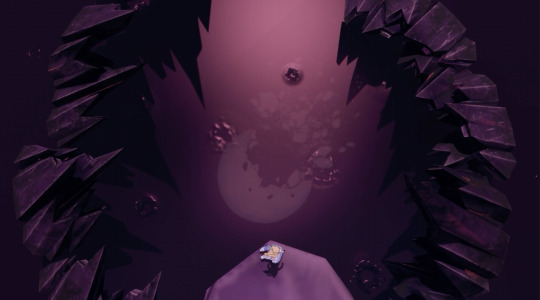
is one hell of a symbol, and humankind is the combined essence of the brother gods. salem had the pure essence of light's power in her soul when she jumped into the pool of grimm and...bonded with it; it's not implausible to think that she might have inadvertently repeated the process by which the brothers made humans in the first place and thus made the revival possible.)
and while she obviously Does Not have a great time after humanity comes back—miserable rotting hovel in the woods because she looks like a grimm and everybody is terrified of her and all—the instant ozma returns to her, she leaps not to destruction but to CREATION. to "let's use our power to guide people, help them, let's build a new and better world than the one the gods destroyed." and all downward spirals into their tyrannical crusade aside, they did that. their kingdom prospered and they had to all appearances four completely ordinary human children and it's really not salem's fault that her husband spent that Entire Time lying through his teeth to her about his true intentions and service to her cosmic torturers ghgksf
anyway the point is—the way i read her transformation is twofold.
first, fundamentally it was an act of rebellion, the choice that firmly and finally ended the possibility that she would ever, ever engage with the gods on their own terms again. the god of light flooded her with pure creation to punish her for being human, and by submerging herself in the wellspring of his brother's power she restored the balance of her own soul.
and second, i think her corrupted appearance is a device the narrative is using to great effect to explore the dehumanization and the alienation she's experiencing as a direct result of the god of light, and ozma by extension, making her the scapegoat for the half of human nature that did not come from light. she looks grimm and her association with the grimm is the foremost obstacle standing between the heroes and the actual solution to the problem she represents—which of course begins with conceiving of her as a person who has made and is still making horrific choices, instead of as an inhuman monster they must stop by force.
(you know how blake is revealed to be a faunus by way of her exploding "well maybe we were just tired of being pushed around!" in the heat of an argument about the white fang's extremism and then fleeing in distraught panic until she reaches the statue in the courtyard of the huntsman and huntress standing triumphant over the grimm and she can't find herself in the human heroes but then she looks down and sees herself in the grimm as she slowly reaches up to remove the bow she's been using to hide the features that would get her branded as a monster by people who refuse to look past the parts of her that don't look human? you know how the white fang specifically wear grimm masks because "humanity wanted to make monsters out of us, so we chose to don the faces of monsters"? yeah i think abt that a normal amount)
21 notes
·
View notes